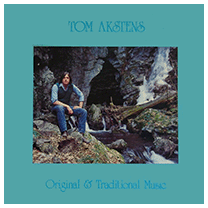 Tom Akstens "Original And Traditional Music" (Takoma Records, 1976) (LP)
Tom Akstens "Original And Traditional Music" (Takoma Records, 1976) (LP)
(Produced by Artie Traum & Thomas Mark)
Seventies-hip acoustic twang by a New York State picker with an obvious debt to the patron saint of oddball newgrass twang, John Hartford. The album opens with a zippy, western swing-flavored rendition of "Milwaukee Blues," then dips into a slightly saccharine folkie tone on "River Song," which though a bit strained is in keeping with its times and also reflects Akstens' lifelong interest in nature, and fly fishing in particular. Aksten then veers into full Hartford mode on a pleasantly gangly version of "Honey Babe," one of several similar bluegrass-meets-blues tunes that inhabit this album. Perhaps the album's real gem is an original banjo instrumental called "Stream Running Backwards," an innovative, meditative tune which may explain why John Fahey's label put its weight behind this odd little album. Eclectic fiddler-picker Jay Ungar is also on here, as well as steel player Bob Siggens, and Neil Rossi, who has worked with Akstens on a long string of roots music projects ever since. Overall, a strong, solid album with just a couple of tunes you might want to skip: a pretty good ratio, if you ask me. A college basketball star, English professor, lifelong naturalist and longtime fly fishing guide, Tom Connelly Akstens later dropped the "Tom" and kept the Connelly and redefined her gender, penning a transgender memoir, Without Shame, which incorporates these disparate elements into what seems like a pretty remarkable life story. Also, cool record.
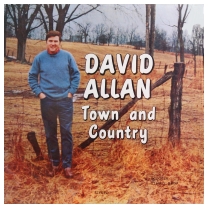 David Allan "Town And Country" (Scooter Records, 1968) (LP)
David Allan "Town And Country" (Scooter Records, 1968) (LP)
(Produced by Nate Schwartz)
Songwriter David Allan was a longtime presenter on Albany, New York's WRGB-TV, where he hosted a "dialing for dollars"-style game show, and had a sideline as a musician and recording artist. On this album, recorded with Pete Williams and the Goodtimes Three, he records a bunch of original material, much of it with a light novelty feel, including songs like "Miss Understanding," "Turn Off The Memories," "That's How The Word Gets Around," "When A Woman Really, Really Loves A Man" and "Bone Lonely."
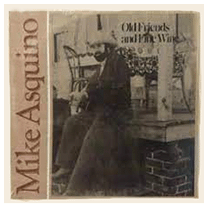 Mike Asquino "Old Friends And Fine Wine" (Red Cloud Records, 1980) (LP)
Mike Asquino "Old Friends And Fine Wine" (Red Cloud Records, 1980) (LP)
(Produced by Ben Beckley, John Nagy & Chris Cassons)
A folkie-country set from upstate New York... Asquino also released a couple of albums in the early 2000's...
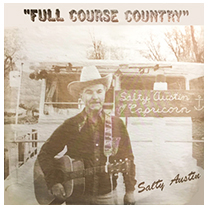 Salty Austin "Full Course Country" (Seneca Records, 1976) (LP)
Salty Austin "Full Course Country" (Seneca Records, 1976) (LP)
(Produced by Peter Bomber)
The self-styled "Eastern king of western swing," fiddler Lloyd H. Austin (1918-2018) grew up in rural western New York, leaving home as a teen during the Great Depression to follow a career as a country musician. He returned to upstate New York after serving in World War Two, and continued to play music and to produce his own radio show. He recorded this album while in his fifties, living on a houseboat (pictured on the cover) which he docked at Watkins Glen, on Lake Seneca. The songs are all Austin originals, including two, "Crank Up The Music"/"Touch Me Gently," which were also released as a single. Although his obituary states that Mr. Austin played all the instruments on these tracks, the album lists his backing band as George Coleates on bass, Danny Hart (pedal steel), Chuck Murphy (lead guitar) and Terry West on drums, while Mr. Austin plays "three fiddles" and sings "three voices," presumably through the magic of multi-tracking. As far as I know, this was his only album.
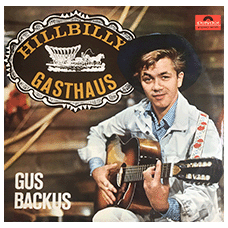 Gus Backus "Hillbilly Gasthaus" (Polydor, 1964) (LP)
Gus Backus "Hillbilly Gasthaus" (Polydor, 1964) (LP)
Although a well-known star of German schlager (pop music), Donald Edgar Backus (1937-2019) was actually an American, born in Long Island, New York, and had started his musical career as a member of the East Coast doo-wop group called The Del-Vikings. Backus emigrated to Germany in the early 1960s during a stint in the US Air Force, following his deployment to an American military base in West Germany. Starting in 1959 he recorded numerous singles and LPs, and though not all of them were country-flavored, these two early releases were modest twangfests, and are actually quite nice. The albums are alternate versions of each other, this first one being German-language, and the second (Hillbilly Inn) sung in English. ("Gasthaus" is a German word for "inn," though the songs on the two albums are not identical.) Nashville's Bill Justis and his orchestra back Herr Backus on both albums, and though the arrangements are admittedly a bit kitschy, the overall vibe is pretty good. Definitely worth a spin.
Gus Backus "Hillbilly Inn" (Polydor, 1964) (LP)
This was an English-language country album, released at almost the same time as Hillbilly Gasthaus. The is some overlap of songs between the two album, but it's not complete... Both records feature arrangements by Nashville producer Bill Justis, as well as from Backus's German collaborator, Werner Scharfenberger.
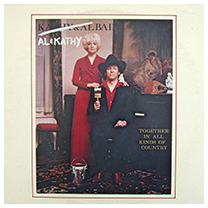 Al Bain & Kathy Bain "Together In All Kinds of Country" (Trackdown Records, 19--?) (LP)
Al Bain & Kathy Bain "Together In All Kinds of Country" (Trackdown Records, 19--?) (LP)
(Produced by Alan W. Prince)
This husband-wife duo from Salem, New York started their recording career around 1970, cutting a couple of singles for the Nashville-based Chart label, although they stuck pretty resolutely to a regional base of operations in rural upstate New York. At the time they cut this album, the Bains had a weekly radio show on WWSC in Glen Falls, although they were also in the orbit of the WWVA "Jamboree USA" revue, down in Wheeling Virginia. Fans of Bill and Delia Bell might appreciate their acoustic-based sound, which dips into country classics such as "I Fall To Pieces" and the Bob Wills oldie, "Roly Poly," along with songs by Johnny Bond, Roger Miller and Willie Nelson. Perhaps most telling are a couple of tunes from Merle Travis, including "Sweet Temptation," which was one of their signature songs. Al Bain played both banjo and guitar, while Kathy Bain wielded an upright bass; they are backed by drummer Bil Anderson and multi-instrumentalist Gary Blodgett, who led his own Blodgett Family bluegrass band and performed with the Bains for several decades.
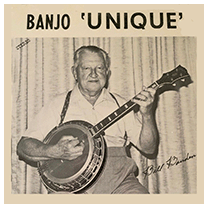 Bill Banden "Banjo Unique" (Duncan Records, 1979) (LP)
Bill Banden "Banjo Unique" (Duncan Records, 1979) (LP)
(Produced by Dick Duncan & Rick Duncan)
Not every banjo player comes at the instrument from a country angle: there's a long history of banjo renditions of popular tunes, stretching back to vaudeville, music halls and, of course, the 19th Century minstrel shows. For his part, Bill Banden -- a whiz on the four-string tenor banjo who hails from Schenectady, New York -- tackles classical melodies from Schumann, as well as pop tunes such as "La Paloma," "Somewhere Over The Rainbow," and "The Third Man Theme." He also touches on a few rural ditties, such as "Arkansas Traveler" and "Kain-Tuck" before veering back to "The Sound Of Music" and "Pop Goes The Weasel." So, I suppose the real issue with this one is how much you like the instrument itself, as opposed to any particular style. Apparently Mr. Banden performed on radio and TV for over three decades before cutting this album; he backed by album producer Rick Duncan on bass and guitar, as well as Dick Duncan, who plays second banjo on one tune, "Back Home Again In Indiana."
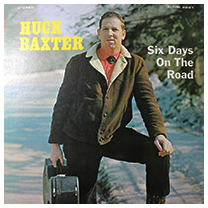 Huck Baxter "Six Days On The Road" (K-Ark Records, 197-?) (LP)
Huck Baxter "Six Days On The Road" (K-Ark Records, 197-?) (LP)
(Produced by John Capps)
Harold "Huck" Baxter was a singer from Peekskill, New York, a working-class guy who started his own band in 1960, after he got out of the Army. He headed down to Nashville to record this set of country covers, presumably with a professional studio crew. Sadly, the musicians aren't listed, but it was a pretty professional group, albeit with a light touch -- half countrypolitan smooth, half, hey, we're all paid by the hour. But there's definitely plenty of twang, particularly on the Dave Dudley title track... For the most part, I like Baxter's vocals, although he gets a little wobbly on the high notes. What's most interesting, though, is how he sings with a distinctly Eastern accent, very smooth, generic "TV voice," with little or no trace of Southern affectations. Crooners like Hank Locklin or Jim Reeves come to mind, although Mr. Baxter does show some rough edges when he wants to. Most of the material is of mid-to-late '60s vintage, including versions of "Green, Green Grass Of Home," and Buck Owens' 1964 hit, "Hello Trouble," as well as Bobby Austin's "Apartment No. 9." However, this is definitely an early '70s album, since it also includes Merle Haggard's "The Fightin' Side Of Me," which climbed the charts in 1970. I think my favorite part of this whole LP, though, is the part in the liner notes where he is described as "red-haired, blue-eyed and single," and tells you about his favorite hobbies (cooking, etc.) Aw, shucks!
 Bill Billington "Sex, Drugs And Country Music" (Nu-Sound Records, 1974-?) (LP)
Bill Billington "Sex, Drugs And Country Music" (Nu-Sound Records, 1974-?) (LP)
(Produced by Tommy Floyd)
Outlaw novelty twang from upstate New York... All but two of the songs were written by Billington; Gary Harrison provided the others, including one song co-written with Dean Dillon. This album includes tunes like "Sex, Drugs And Country Music," "Bartender Woman," "Always Agree With Your Mother" and "Big Bad 1200 CC Harley."
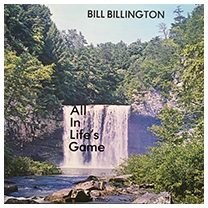 Bill Billington "All In Life's Game" (Nu-Sound Records, 1980) (LP)
Bill Billington "All In Life's Game" (Nu-Sound Records, 1980) (LP)
(Produced by Tommy Floyd)
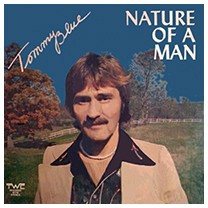 Tommy Blue "Nature Of A Man" (TWC Records, 1977) (LP)
Tommy Blue "Nature Of A Man" (TWC Records, 1977) (LP)
(Produced by Walter Balderson & Jerome Haggert)
A singer originally from Long Island, Tommy Blue was also in a New York-based band called The Northwest Passage, which released an album on the TWC label at basically the same time as this one. Blue recorded most of this "solo" set down in Nashville, booking time at Bradley's Barn with usual-suspects studio crew that included Harold Bradley, Lloyd Green, Pete Wade, and the Lea Jane Singers. About half the songs are credited to R. Sanders, circa 1974-77, with two other songs credited to R. Landis and one called "Life's One Big Rip-Off," written by John Carlten (aka John C. Chumbley), who shared the Saddle Song publishing company with Sanders... Carlten played piano on the Northwest Passage album, although he wasn't officially listed as a member of the band. In addition to the original numbers, there are also songs by Kris Kristofferson, and oldies such as "A Fool Such As I" and Leon Payne's "They'll Never Take Her Love From Me."
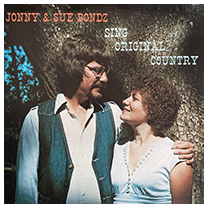 Jonny & Sue Bondz "...Sing Original Country" (Bondz Records, 1975-?) (LP)
Jonny & Sue Bondz "...Sing Original Country" (Bondz Records, 1975-?) (LP)
Not to be confused with Texas honkytonker Johnny Bond, New York state native John Bondzinski was a multi-instrumentalist perhaps best known for his work as a steel guitar player, and for his song, "I've Played Second Fiddle (For The Last Time)," which he first recorded for Starday back in the mid-'60s. Bondzinski played gigs in and around his hometown of Glens Falls, NY as well as across the border in Vermont, and opened a music store called Bondz Music, which he ran for several years before moving down to Wildwood, Florida with his wife Susan. They were living in the Sunshine State when they recorded this album, which is filled with all-original material, including songs like "Second Fiddle," "Happy State Of Mind" and "In A Redneck Bar." I think they're the only two musicians on here -- they both sing and he played a variety of instruments, through the magic of multi-tracking, and they are "backed" by their pet drum machine, who they nicknamed "Winchester."
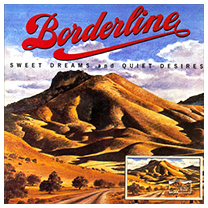 Borderline "Sweet Dreams And Quiet Desires" (United Artist/Avalanche, 1972) (LP)
Borderline "Sweet Dreams And Quiet Desires" (United Artist/Avalanche, 1972) (LP)
(Produced by Jon Gershen, Nick Jameson, Bob Ludwig & Jim Rooney)
This short-lived country-rock band was assembled from the from the Woodstock, New York roots music scene, and in particular from the Bearsville Sound Studio, where the multi-talented Jim Rooney joined brothers Dave Gershen and Jon Gershen along with a countless cast of proto-Americana icons, including fiddlers Vassar Clements, Jim Colgrove and Ken Kosek, superpicker Ben Keith and a couple of dudes from The Band. Borderline released only one album, their second effort getting shelved for several decades... Both albums have since been re-released as a twofer CD (listed below). BTW: anyone know what the Gershens did after this?
Borderline "Sweet Dreams And Quiet Desires/The Second Album" (Real Gone Records, 2013)
A twofer reissue that includes both their first LP and the "lost" album that was only semi-released in the intervening years.
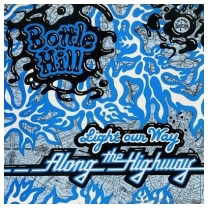 Bottle Hill "A Rumor In Their Own Time" (Biograph Records, 1972) (LP)
Bottle Hill "A Rumor In Their Own Time" (Biograph Records, 1972) (LP)
(Produced by Arnold A. Caplin)
An old-timey band with a modern sensibility, this ensemble from New York State (and New Jersey) had a repertoire that included covers of Paul Siebel's "Any Day Woman," Gram Parson's "Christine's Tune" and the Rolling Stone's "Honky Tonk Woman." And plenty of weird, craggy stringband stuff as well! Guitar/banjo picker Lew London went on to record as a solo artist and also toured and collaborated with fabled singer-songwriter Steve Goodman.
 Bottle Hill "Light Our Way Along The Highway" (Biograph Records, 1976) (LP)
Bottle Hill "Light Our Way Along The Highway" (Biograph Records, 1976) (LP)
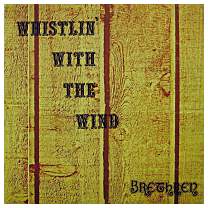 Brethren "Brethren" (Tiffany Records, 1970) (LP)
Brethren "Brethren" (Tiffany Records, 1970) (LP)
(Produced by Jay Senter & Doc Siegel)
A hippie-era rural rock band with kind of a rootsy, country-adjacent vibe. The band included guitarist Tom Cosgrove, Mike Garson (organ and piano), Rick Marotta (drums) and Stu Woods on bass, with additional help from Dr. John on keyboards, and Rusty Young playing pedal steel, as well as The Blossoms chiming in on backup vocals. The songs were mostly originals, as well as one from their producer, Jay Senter, and a couple of cover tunes, including one by James Taylor called "Don't Talk Now," which Taylor has previously recorded on his 1968 debut. Although Brethren was one of countless here-today, gone-tomorrow bands of the early 1970s, the bandmembers went on to do a lot of studio work: Tom Cosgrove was a prolific 'Seventies session player; Mike Garson made a successful leap into jazz music, both on his own albums and as a frequent collaborator with Stan Getz, and also worked with numerous pop stars, as did drummer Rick Morotta and bass player Stu Woods. Google 'em sometime -- they played on some pretty groovy albums! It looks like these guys were originally from New York City, though their careers drew them to LA later on...
 Brethren "Moment Of Truth" (Tiffany Records, 1971) (LP)
Brethren "Moment Of Truth" (Tiffany Records, 1971) (LP)
(Produced by Don Casale, Eddie Kramer & Dave Palmer)
Their elusive second album featured the same founding lineup of Cosgrove, Garson, Marotta and Woods, though the band had moved on to a heavier, more funk-oriented, party-down sound, with hints of the Meters and other contemporary rock-funk pioneers. In place of the rootsy, pedal steel sound, they brought in a small horn section and a conga drummer, so this may have limited appeal to twangfans... Although they did cover Doctor John's "Loop Garoo," so there's still a rootsy vibe in the mix.
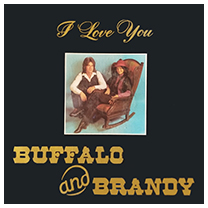 Buffalo & Brandy "I Love You" (KM Records, 1981) (LP)
Buffalo & Brandy "I Love You" (KM Records, 1981) (LP)
(Produced by Jim Williamson & Cathy Potts)
A bit of a mystery album. Formed in 1977, the duo of Buffalo and Brandy are not identified by name, though they were definitely from North Tonawanda, New York, up by Niagra Falls. "Brandy" was local gal Mary Ann Ferree, while "Buffalo" mighta been Mike Stripling, who wrote or co-wrote all the songs on this album, and also plays rhythm guitar on this disc. However, the photo of Stripling on the back cover doesn't quite look like the guy on the front. I dunno. Anyway, this album seems to have been a pretty straightforward shot at contemporary (late 'Seventies-style) country heartsongs and ballads -- they went to Nashville and cut this set with backing by some seasoned pickers, with Mike Stripling on acoustic guitar, and Clyde Brooks (drums), Ralph Childs (bass), Lloyd Green (steel guitar), Tony Migliore (piano), Don Roth on lead guitar, and the Cates Sisters singing backup. They also released a string of singles on this label, for several years running, at least up until the mid-1980s, including a lot of material not included here. Ferree later formed a nonprofit 501-(C) around the group, turning her attention towards children and early intervention to prevent delinquency. I think they changed the focus of the act as well, playing primarily children's music at community events around North Tonawanda, right up through the 2020s(!)
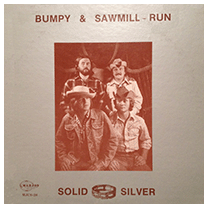 Bumpy & Sawmill Run "Solid Silver" (Marjon International Records, 1977) (LP)
Bumpy & Sawmill Run "Solid Silver" (Marjon International Records, 1977) (LP)
(Produced by Johnny Krizancic)
Dunno too much about this New York state band, though they seem to have been big Gram Parsons fans, covering "Sin City" on this album, along with classics by Hank Williams, Waylon Jennings, Johnny & Jack, Terry Fell and others... Also, yet another rendition of "Red Neck Mother" for us to add to the list. The group included Skin Anderson on drums, Jeff Lewis, L. E. Leidecker (bass), Don "Bumpy" Peterson, Scott Seger, and Lance Schnur on pedal steel... Schnur also played on an album by another Krizancic-produced group called The Silver Spurs, who also released an album on Marjon International not long after this one.
Bumpy & Sawmill Run "Dim Lights, Thick Smoke" (Bollweevil Records, 19--?) (LP)
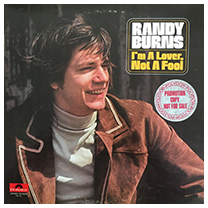 Randy Burns "I'm A Lover, Not A Fool" (Polydor Records, 1972) (LP)
Randy Burns "I'm A Lover, Not A Fool" (Polydor Records, 1972) (LP)
(Produced by Barry Seidel)
Songwriter Randy Burns was a Greenwich Village folk-scene refugee who got into trippier acid-rock territory on his early albums for the cult-fave ESP-Disk label, recording with a group called the Sky Dog Band... Cruising into the 'Seventies, Burns dipped a bit into the nascent country-rock sound, as heard on some of the tracks here. Mostly this album is filled with expansive, melodic, pop with airy, orchestral arrangements and spacey lyrics... But there's also the skanky, abrasive swamp-blues of "I'm A Lover, Not A Fighter," a few tracks that kind of sound like The Band, and a couple of tunes with some true twang in them. Bill Keith and Kenny Kosek help with the country stuff (listed as "Stray Dogs" in the liner notes) and Keith adds some sweet pedal steel licks... I wouldn't peg this as a "country-rock" record, per se, but the rural-sounding tracks are nice, as well as the purty-sounding rock songs.
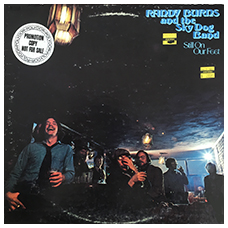 Randy Burns "Still On Our Feet" (Polydor Records, 1973) (LP)
Randy Burns "Still On Our Feet" (Polydor Records, 1973) (LP)
(Produced by Mark Abramson & Jay Messina)
A remarkable album, which was for all intents and purposes, Randy Burns' swan song... Though there is some country-ish/jug band-y twang, mostly Burns delves deep into the contemplative/confessional mode of the era, evoking (in hindsight) comparisons to Harry Chapin, Nilsson, Nick Drake and the more rueful, late-edition folk-rock version of Phil Ochs. Each of the songs are compelling, in an odd way, Burns and his band had a distinctive feel, with an emotionally density and shading that feels unusual for the time. His songs have a troubling nuance, painting a picture of a habitual drinker with a poetic soul and a bit of a mean streak, a hip, rueful, self-absorbed guy who doesn't want to get hung up on or trapped by any of his girlfriends, but who crafts beautiful songs nonetheless. This unflattering self-portrait anticipates the non-idealized confessionalism of "Americana" artists decades down the road -- I'm thinking of folks like Mary Gautier, Tom Russell and Lucinda Williams, and places this album as a striking precursor to a darker, more honest style of song. Plus, some of the melodies are haunting and memorable... One of the strongest of these songs in the album's closer, "Seventeen Years On The River," which pairs a beautiful melodic hook to an arrogant, defiant selfishness, placing listeners in a conflicted state, humming the chorus to a troubling song. In addition to the originals by Burns and keyboard player David Tweedy, there's a nice, straightforward rendition of Steve Gillette's version of the folk ballad, "Darcy Farrow" and, in an equally jarring change of tone, the sarcastic jugband ditty, "Better Things." All in all, a nice record, and an unexpected gem. Recommended.
Laura Cantrell - see artist discography
 Central Park Sheiks "Honeysuckle Rose" (Flying Fish Records, 1976) (LP)
Central Park Sheiks "Honeysuckle Rose" (Flying Fish Records, 1976) (LP)
This string-swing ensemble from New York was a popular act on the East Coast coffeehouse and college circuits, mixing country, folk and acoustic jazz, with a high level of musicianship and precision. Among the group's many talented members was violinist Matt Glaser, who went on to do session work with a wide list of artists, in addition to working on Ken Burns' documentaries The Civil War and Jazz, and became a tenured faculty member at the Berklee College of Music in Boston. This is a lovely little record, with a light, lilting feel and a great sense of confidence from the band. Fun stuff, and plenty classy, too.
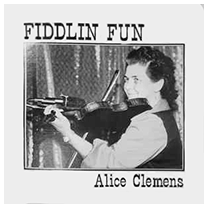 Alice Clemens "Fiddlin' Fun" (Osceola Records, 19--?) (LP)
Alice Clemens "Fiddlin' Fun" (Osceola Records, 19--?) (LP)
One of several recordings by Alice Colvin Clemens (1923-1999) a championship fiddler from upstate New York who learned music from her family and began performing when she was just seven, later forming her own band around 1949. Ms. Clemens was a three-time state champion in the "ladies" division, retiring from competition after her third consecutive win. Along with her cousin, Ray Cronk, she co-founded New York State Olde Tyme Fiddlers Association in the 1970s and in 1981 helped set up the North American Fiddlers Hall Of Fame in her hometown of Osceola, NY. She's backed on this album by Hank Bisner (piano), Mac Claflin (bass), Diana Clemens (guitar) and Brian Hatfield on drums.
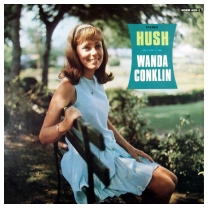 Wanda Conklin "Hush" (Norm Records, 1969) (LP)
Wanda Conklin "Hush" (Norm Records, 1969) (LP)
(Produced by John Sands)
Originally from Glen Falls, New York, singer Wanda Conklin found herself down in the Lone Star State after following her husband Jack Conklin, an active US Air Force sergeant, to his post at Denison, Texas, just north of Dallas. She started singing at NCO shows at the nearby military bases and word about her talent got passed to songwriter and record producer John Sands, who was corralling local talent to record a few of his songs. They originally planned to just cut a single, but things went so well the project expanded into this album, which was recorded in Nashville with arrangements and pedal steel by session great Lloyd Green. Fort Worth country deejay Bill Mack was impressed and subsequently recorded a few duets with Conklin for the nationally-distributed Hickory label, circa 1970-71, with a few more singles to follow on less prominent indie labels, though as far as I know this was her only full LP. Along the way she sand backup for Jerry Lee Lewis when he came through town, and apparently performed at local beerhalls such as The Stagecoach, which was owned by hardcore honkytonker Ray Chaney, who later sold the bar to Bill Mack. Conklin also apparently recorded a TV pilot in Oklahoma City for an aspiring country music host Dale Ward. After that, the trail grows cold, with some sources speculating that she went back to singing gospel music. She got a few brief plugs in Billboard, but the most in-depth profile was an article in The Amarillo Globe-Times, which is the source of most of the biographical info above.
Connie Converse - see artist discography
 The Doug Cook Band "Late Nights And Bar Fights" (Rocking Horse Records, 1977) (LP)
The Doug Cook Band "Late Nights And Bar Fights" (Rocking Horse Records, 1977) (LP)
(Produced by Greg Deutsch & Moira Pomeroy)
Originally a trio, The Doug Cook Band beefed up with the help of a slew of New York session players, to realize this set of all-original country/country-rock material. Perhaps most notable is veteran 'Sixties folkie Sandy Bull on pedal steel guitar, along with songwriter Doug Cook on guitar and vocals, Greg Deutsch (percussion), Bob Hogan (harmonica), Colin Joseph (bass), Olive Joseph (vocals), Neil Sarfati (saxophone), Charlie Scibetta (drums), Ben Tirado (lead guitar), and Peter Weinstock (keyboards). Worth noting: Doug Cook and Ben Tirado later played on folkie Bob Zorn's 1982 album, Lookin' For A Home, which Cook also helped produce.
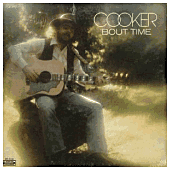 Cooker " 'Bout Time" (Scepter Records, 1974) (LP)
Cooker " 'Bout Time" (Scepter Records, 1974) (LP)
(Produced by Dick Monda & Jon Deviran)
Not entirely a "country" record, but definitely one of those "only in the 'Seventies" albums. Songwriter Norman "Cooker" Des Rosier had a strong background in late '60s hard rock, as a member of the crash-and-burn New York band, The Groupies, who fizzled out and disbanded after blowing their shot at fame when their wild behavior alienated their patrons at Atlantic Records. A few years later, Des Rosier made an attempt at a solo career, and managed to get one song into the lower rungs of the Pop Top 100, "Try (Try To Fall In Love)," which is on this album. Anyway, so much for the history lesson. So what about the album? Well, it's a weird record. Primarily it's weird because Des Rosier is such an improbable lead singer: his voice has a raspy feminine feel, sort of a mix between your chain-smoking great aunt Gertie, and Gabby Hayes from the old cowboy movies. The music is a mix of bluesy folk-rock and weirdo country, but it's hard to focus on the songs themselves because the vocals sound so thin and bizarre. You're continually asking yourself, how the heck did this album get OK'd?? But here it is, an artifact of the experimental, eclectic '70s, a bit less twangy than the other records I've reviewed, but peculiar and rootsy enough to mention.
 Bob Coltman "Before They Close The Minstrel Show" (Minstrel Records, 1975) (LP)
Bob Coltman "Before They Close The Minstrel Show" (Minstrel Records, 1975) (LP)
(Produced by Jerry Epstein & Don Wade)
A mix of traditional old-timey stuff and original tunes, with a stringband from Jackson Heights, New York that includes Jay Ungar, Ed Trickett and Lorainne Lee.
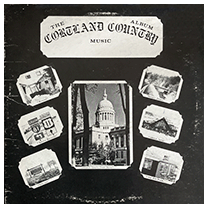 Cortland Country "The Cortland Country Music Album" (Cortland Records, 1977) (LP)
Cortland Country "The Cortland Country Music Album" (Cortland Records, 1977) (LP)
(Produced by Michael Ocello)
A charming though slightly clumsy album, with a very DIY feel... This group from Cortland, NY, in the center of New York state was clearly a local, amateur rock group that also kinda wanted to become an amateur, local country band... Nobody in the band played fiddle, or banjo, or steel and their instruments were echoes of the late '60s garage rock scene, notably keyboards used as a lead instrument, but even though they have a Remains/Turtles vibe in the background, they definitely were playing the piano and guitars with intentional twang, and infusing their songs with a wistful country vibe. The vocals aren't great, but they do have real-folks charm, and all in all this is a nice relic of its time. Indeed, this is one of those gangly, self-released records where your first impulse is to be dismissive, but then maybe you wind up humming a song or two in your head after you've listened for a while.
The Country Brothers "The Heart Of The Country Brothers" (Music City Records, 1976-?) (LP)
Not a lot of info about these fellas... They seem to have been from Batavia, New York (near Buffalo) and they liked secular country as well as religious. Side One of this album includes oldies such as "Brain Cloudy Blues," as well as trucker tunes and more recent hits such as "We Could," which was a hit for Charley Pride in 1974. Side Two is all gospel: not sure if any of this material is original, or if it's all covers.
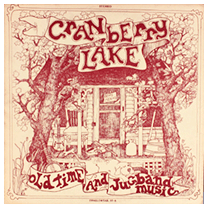 Cranberry Lake "Old-Time And Jugband Music" (Swallowtail Records, 1977) (LP)
Cranberry Lake "Old-Time And Jugband Music" (Swallowtail Records, 1977) (LP)
(Produced by Ken Coleman & Phil Shapiro)
An upstate NY jug band... As typically kooky as expected of the genre, this band included bassist Brian Burns, Lewis Cutler on banjo, Sally Cutler (autoharp, percussion and kazoo), Henry Jankiewicz (fiddle), Harvey Nusbaum (guitar) and Rich Sobel on fiddle and mandolin... Mr. Sobel maintained a website that covered some of the band's history, but alas that site is now kaput.
Cranberry Lake "Lowdown Symphony" (Swallowtail Records, 1980) (LP)
(Produced by Ken Coleman & Phil Shapiro)
Cranberry Lake Jug Band "If This Ain't Genius" (Kicking Mule Records, 1986) (LP)
The same group as above, just making their artistic scope a little clearer with a slight tweak to their name...
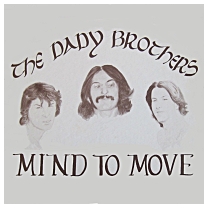 The Dady Brothers "Mind To Move" (Emanon Records, 1979) (LP)
The Dady Brothers "Mind To Move" (Emanon Records, 1979) (LP)
A bluegrass/twang band from upstate New York, playing mostly originals written by John Dady, including "Elaine," "Minstrel Man," "Hitchhiker's Lament," "Mind To Move" and "Lonesome Ugly Me," which was co-written with Michael Pavone, who also wrote one called "Nogales." The cover tunes range from bluegrass oldies such as "Way Downtown" to a Nick Gravenites blues tune ("Theme From Steelyard Blues").
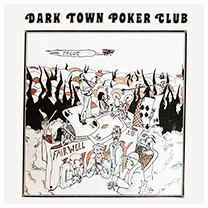 Dark Town Poker Club "Fairwell" (Jeree Records, 1976-?) (LP)
Dark Town Poker Club "Fairwell" (Jeree Records, 1976-?) (LP)
An eclectic longhair band from around Findlay Lake, in the farthest reaches of western New York state, right along the Pennsylvania border. The music isn't strictly country, but does encompass twang, with dips into pop, rock and blues... Alas, though the guys are listed by name -- Scott Anderson, Dan Bachmaier, Tom Baker, Steve Bodie, Paul Matthews, and Gary Olson -- the album doesn't tell us who played which instruments. The album is packed with original material, with Steve Bodie and Tom Mathews as the main songwriters, though others also contribute a tune or two.
 Hank Davis "Crazy Living" (Relaxed Rabbit Records, 1984) (LP)
Hank Davis "Crazy Living" (Relaxed Rabbit Records, 1984) (LP)
Like many early rockabilly also-rans, in the 1970s Hank Davis settled into the comforting arms of the European retro scene. But even as his old singles found their way onto various reissue records, he kept writing and recording music, new stuff as well as remakes of oldies, and this gentle, relaxed DIY set has some nice, unhurried stuff on it. Whether you call it "demos" or "lo-fi," this record is positioned cheerfully and resolutely outside of the pop and/or country mainstream -- it's a personal record, made just because he likes to make music, and it makes up for its lack of polish and propulsiveness with a quiet, heartfelt simplicity and self-assurance: Hank Davis doesn't have to make the record you want him to make, he'll make the record he wants to make. In the liner notes, Davis acknowledges the troubles he's had trying to make a career out of music, but he seems pretty philosophical about it, and content to make an album that's just good enough, not perfect or mind-blowing or a big chartbuster. There are country touches -- pedal steel by Minnie Winston and Rod Braganza, along with mellow acoustic guitar and unfussy vocals. Interesting to hear rockabilly songs laid out at such as slow pace, the bare bones of the style revealed without the amplified wham-bam of electric guitars... Roots music critic Colin Escott contributes spoofish biographical comments as well, though Davis's are more revealing and insightful.
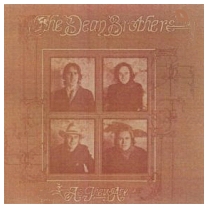 The Dean Brothers "As They Are" (Pilgrim Records, 1976) (LP)
The Dean Brothers "As They Are" (Pilgrim Records, 1976) (LP)
This family band hailed from Skaneateles, New York and played in a variety of regional garage bands and pop-rock acts, dating back to their high school years, when the British Invasion swept through Ithaca and environs. On this album, they mostly played a mix of '70s soft pop, power-pop and cosmic folk/rock, with a notable debt to bands like the Byrds and the Hollies. But there is also a country vibe, especially on the bouncy twang tune, "Who Loves You" and a couple of other tracks with pedal steel. This was the band's only album, recorded while they were basically breaking up (and soon to reform with a different lineup...) Not as much of a "country" record as others in this survey, but still worth having on the radar.
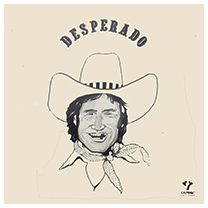 Desperado "Desperado" (Calfdisk Records, 1978) (LP)
Desperado "Desperado" (Calfdisk Records, 1978) (LP)
(Produced by Desperado)
East Coast twang... The leading light behind this Ithaca, New York alt-country group was singer-guitarist Walton Amey, though the spotlight often fell on vocalist Carol Lee (aka Carolee Goodgold) who was a performing arts student at the university and who went on to a very successful career as a commercial singer and voiceover artist. The band was rounded out by bass player Doug Robinson and Paul Marino on banjo and guitar. These folks made two records together, though I'm not sure what happened after that... I think Mr. Amey was originally from Bucks County, Pennsylvania (near Philadelphia) and may have returned there later in life. At any rate, there's a fair amount of original material on here, as well as several well-chosen cover tunes, including a version of the Peter Rowan song, "Midnight Moonlight."
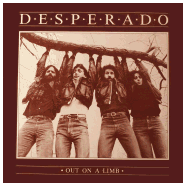 Desperado "Out On A Limb" (PCI Records, 1982) (LP)
Desperado "Out On A Limb" (PCI Records, 1982) (LP)
(Produced by Stephen Schneider & Walton Amey)
This semi-shaggy, Levi's-clad band from upstate New York didn't have a lot of ooomph as country twangsters, but as soft-pop/country-rock act, they had their charm. Their male-female vocal mix included several songs with the spotlight on Carolee Goodgold, who seems to have been a big Linda Ronstadt fan, mimicking Ronstadt's vocals and musical approach, as opposed to Emmylou Harris, who was the other big female country-rock icon of the era. Desperado seems to have been aiming for a mix of indie-twang and hopeful commercial success as a pop act, but the style of music harkened back to pre-disco AOR of a half-dozen years earlier. This has its moments, and is a genuine slice of '70s(ish) DIY, but it didn't really wow me.
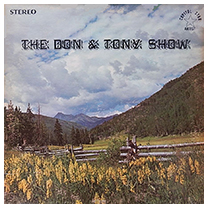 The Don & Tony Show "The Don And Tony Show" (QCA/Capitol Star Artist Records, 1970-?) (LP)
The Don & Tony Show "The Don And Tony Show" (QCA/Capitol Star Artist Records, 1970-?) (LP)
(Produced by Dave Wetzel & Bill Dengler)
Back in 1960, singers Donnie Lee Bailes and Tony Starr formed a duo, later expanding into the eight-person ensemble which made this record... They spotlighted a child performer named Junior Thomas, who sings on a tune or two, sandwiched between Don and Tony, who take turns singing lead on the other songs, including a version of "Before The Next Teardrop Falls." Amid a slew of classic country covers, there's one original, "Why Do You Roam," written by Tony Starr... they also cover "Help Me Make It Through The Night," dating this album to at least 1970. I'm not sure how long this group stayed together, but Bailes was still doing shows in Rochester, New York as late as the mid-1990s, fronting a band called the Cannonball Express -- quite a career!
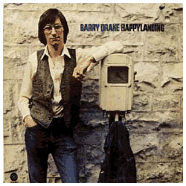 Barry Drake "Happy Landing" (Capitol Records, 1971) (LP)
Barry Drake "Happy Landing" (Capitol Records, 1971) (LP)
(Produced by Terry Knight)
I was drawn to this album by the presence of a couple of country-bluegrass twangsters in the credits, fiddler Kenny Kosek and Bill Keith (usually a banjo whiz, but here playing pedal steel) However, as a potential country-rock nugget, this record turned out to be a bit of a dud. A dud in general, I guess, although hardcore '70s soft-pop devotees might be able to look past Drake's thin voice and the overall derivative nature of the demi-psychedelic, Emitt Rhodes-ish pop-orchestral arrangements and enjoy this as a period piece. It's not awful, by any means, just resolutely mediocre. A couple of tunes have some twang to them, but nothing to write home about, really. Perhaps the most interesting thing about New York City native Barry Drake was his second act in rock'n'roll, in which he established himself as an official expert in all things rock, becoming a popular lecturer on the college circuit for folks who want his insights into several generations of rock and pop culture... To which this was his first personal contribution.
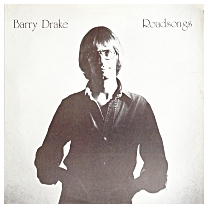 Barry Drake "Roadsongs" (Catskill Mountain Records, 1977) (LP)
Barry Drake "Roadsongs" (Catskill Mountain Records, 1977) (LP)
(Produced by Barry Drake)
This album, self-recorded in a home studio up in the Catskills, mainly features Drake multi-tracked on a variety of instruments, with minimal help from other musicians on a few of the songs. Drake seems to have found a more comfortable stylistic niche for himself, playing in roughly the same mode as Paul Siebel, basically singer-songwriter folk, with an awareness of pop and blues in the mix. Some songs are interesting, like the album's opener, "Troubadours," where he talks about how he's dropped out and headed for the country while his music business friends are still doing their stuff out in the rat race... (My ear was caught when he name-dropped Loudon Wainwright III, who at the time was riding high on the cult success of his infamous novelty song "Dead Skunk"...) On Side Two, he lapses into a more distinctly John Denver-ish style, light, blithe folk-pop with pretty clear-cut melodies. Although Drake remains a fairly underwhelming performer, and many of the songs seem contrived -- particularly the character sketches of hobos and proud unbowed Confederate soldiers -- this is still a strong, authentic effort for the DIY folk scene of the time, derivative to be sure, but I think also a cohesive realization of Drake's artistic vision... If you're into obscuro-folk outings, this one's certainly worth a spin.
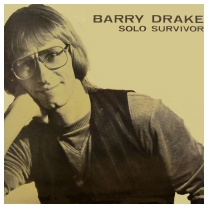 Barry Drake "Solo Survivor" (Catskill Mountain Records, 1982) (LP)
Barry Drake "Solo Survivor" (Catskill Mountain Records, 1982) (LP)
(Produced by Barry Drake)
 Joe Droukas & His Crazy Man Band "Goodbye Joe Drake" (Sweet Fortune Records, 1973) (LP)
Joe Droukas & His Crazy Man Band "Goodbye Joe Drake" (Sweet Fortune Records, 1973) (LP)
(Produced by Eddie Jason)
Well-meaning country-rock/folk-pop with a definite early 'Seventies hippie vibe. Fairly perky music with an eclectic feel and a persistent thread of countryish twang, particularly in the dobro and banjo work by Paul Prestopino. New Yorker Joe Droukas samg his own original material with backing by a mix of studio pros such as Hugh McCracken and Rick Marotta -- along with a cameo by Toots Thielman -- and others who seem less familiar and may have been members of his own band. Droukas's overly self-conscious liner notes make reference to current events and topical issues and some of the lyrics are fairly depressing and grim, reflecting the downcast political mood of the Watergate era. Probably not much here that will really wow you, but it is a good example of the searching, sometimes-strained experimentation of the times. Worth checking out if you're heavy into 'Seventies soft-pop and whatnot, though most casual listeners (and country-oriented twangfans) can skip it.
Joe Droukas "Shadowboxing" (Southwind Records, 1975) (LP)
(Produced by Eddie Germano)
 Tom Edington "Sings Cowboy Gold" (MarJon Records, 1978) (LP)
Tom Edington "Sings Cowboy Gold" (MarJon Records, 1978) (LP)
(Produced by Johnny Krizancic & Helmut Schumacher)
Hailing from Falconer, New York, near the Pennsylvania border, Tom Edington seems to have been a mostly-amateur musician whose talent was spotted back in the early 'Fifties by local legend Donald "Bumpy" Peterson, who asked Edington to sing on one of his records, and in turn encouraged him to cut an album of his own on the regional MarJon label, based in Hermitage, PA. On this mid-'Seventies outing, Mr. Edington is backed by another MarJon band, Rege Easler & The Silver Spurs, comprised of Rege Easler on guitar, Wilkie Granger (drums), Billy Hackathorn (bass), Jack Osborne (guitar), Skip Reznor (piano), and Lance Schnur on steel guitar. The set includes five songs written by Edington: "Give My Love To Wichita," "I Call Her Honey," "Lettin' Go," "Spittin' Image" and "Yesterday's Rain." The other tracks aren't credited, though they include Merle Haggard's "White Line Fever" and Neil Diamond's "Cracklin' Rosie," which perhaps gives some idea of Edington's range. He also cut a single or two and years later in the digital era, Mr. Edington released some stuff on CD.
 Tom Everett "Porchlight On In Oregon" (RCA Victor, 1971) (LP)
Tom Everett "Porchlight On In Oregon" (RCA Victor, 1971) (LP)
(Produced by Ray Errol Fox & Barney Keville)
A freak-folk oddity album, with true twang on several tracks provided by Eric Weissberg playing pedal steel and banjo, and David Bromberg on guitars and mandolin. Tom Everett was a classically-trained musician from Portland, Oregon who played cello in a regional symphony orchestra, then studied drama at the The London Academy of Music and Dramatic Arts, after which he moved to New York to try and make it as an actor. Along the way, he had a folkie phase, playing gigs at the Gaslight Cafe and other venues. Success on Broadway and as a character actor in numerous films liberated Everett from his music career, though this album is a fine legacy of his early years... It is also a stylistic hodge-podge: there are a bunch of flowery chamber-folk arrangements with cellos and strings, as well as more stripped-down acoustic numbers featuring Everett on 12-string guitar... The songs are all weird, stoned, hippie-era meanderings, with the slower, more lyrical material edging into the artsy pretensions of the early, post-folk singer-songwriter scene, though there's also a surprising level self-awareness, with Everett approaching his own spaciness with a healthy dose of deflation and good humor. The uptempo twangtunes are best, accentuating the intentional levity in a way that brings to mind folk pranksters like the Holy Modal Rounders... Plus, there's some great picking! I wouldn't say this is a record that most people would want to listen to repeatedly, but it's definitely not a dud, either... Nice period piece, on the more esoteric end of the spectrum.
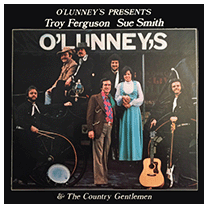 Troy Ferguson & Sue Smith "O'Lunney's Presents..." (O'Lunney's Country Music City, 1975-?) (LP)
Troy Ferguson & Sue Smith "O'Lunney's Presents..." (O'Lunney's Country Music City, 1975-?) (LP)
(Produced by Steve Karliski, Dave Halbert & Art Polhemus)
A souvenir of O'Lunney's, a New York City bar that went country in 1973, with the husband-wife team of Troy Ferguson and Sue Smith quickly becoming a long-term house band over the next few years... They are joined here by son Mark Ferguson on bass, Tommy Higgins (drums), and Butch Natale (steel guitar). Also of note is album producer Steve Karliski, who was a successful pop and country songwriter in the early 'Seventies, perhaps most notably writing the hit "Yes, Mr. Peters" -- he contributes two songs here, "His And Hers" and "That's How It Always Happens In A Song." Other originals include "The Band Backed Me Up (While I Cried)" and "You Are The One," complimented by a few classics ("Crazy," "Silver Threads And Golden Needles," Merle Haggard's "Sing Me Back Home," and "I Don't Love You Anymore," which had recently been a minor hit for Charlie Louvin, and Kris Kristofferson's "Why Me Lord.") Nice, eclectic set!
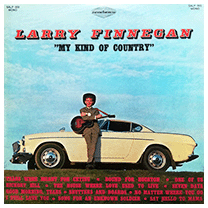 Larry Finnegan "My Kind Of Country" (Svensk American, 1966) (LP)
Larry Finnegan "My Kind Of Country" (Svensk American, 1966) (LP)
American-born John Lawrence Finneran (1939-1973) was a teenpop/rockabilly singer from New York whose big hit, "Dear One," came out back in 1961, during the Kennedy administration. "Dear One" almost cracked the Top Ten, but subsequent singles flopped, so though he started out on American labels, Finneran found his biggest fans in Europe, and soon signed to Sonet Records in Denmark. He cut numerous singles for Sonet before moving to Sweden and starting his own label, Svensk American, which was based in Stockholm, and also had some kind of licensing deal in the UK. The title of this LP is entirely accurate: all the songs were Finneran originals, part of his new career as a songwriter, with his biggest successes from pitching material to European artists. Though he released a slew of singles under the Larry Finnegan stage name, this seems to have been his only full album of English-language material; a posthumous double album was released several years after his death in 1973.
Larry Finnegan "Larry Finnegans Basta" (Svensk American, 1968) (LP)
Mr. Finneran recorded a fair amount of Swedish-language material as well, with numerous songs written by or with Swedish collaborators such as Olle Bergman, Ingvar Hellberg and Rune Walleborn, who were all pop musicians with careers of their own. Not sure how much of a country vibe is in any of these tracks, though. (Note: this was re-released in the 1970s under the title Larry Finnegan Pa Svenska.)
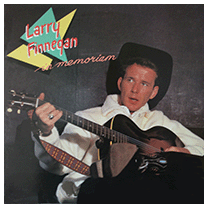 Larry Finnegan "In Memoriam" (Sonet Records, 1979) (LP)
Larry Finnegan "In Memoriam" (Sonet Records, 1979) (LP)
After living in Sweden for much of the 'Sixties, Finneran returned to the United States in 1970, retiring to South Bend, Indiana and passing away in 1973 as the result of a brain tumor. This posthumously-released, two-disc retrospective includes many (if not all) of his singles on Sonet and Svensk American, as well as earlier stuff like "Dear One" and his other American recordings; the last ten tracks were the entire My Kind Of Country album.
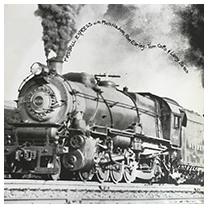 Fireball Express "Fireball Express" (Casino Records, 197--?) (LP)
Fireball Express "Fireball Express" (Casino Records, 197--?) (LP)
(Produced by Bart Curtis)
Well, you know me, I'm always a sucker for any version of the 'Seventies oldie, "Aime" -- it's just such a great pop song! These guys seem to have been from around Ithaca, New York -- the album was made at a studio in Elmira, near the Pennsylvania border, and the band played gigs on both sides of the state line. At the time this album was made, the group included Rich Hawkins (lead guitar), Ron Earley (drums), Tom Caffo (bass) and Larry Bates on steel guitar. Although keyboardist Jim DePaul was considered a "guest" artist when they were in the studio, let's just be nice and say he was in the band, too. It was a while ago. Fireball Express was still together in the late '80s, though with a different lineup which still included Earley and Hawkins, as well as a gal singer called Linda Lee, who had experience singing of some regional "jamboree" variety shows. Any additional info about these folks would be welcome!
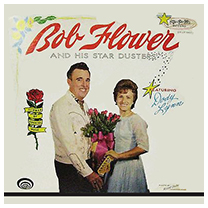 Bob Flower "...And His Star Dusters" (Do-Re-Me, 1966) (LP)
Bob Flower "...And His Star Dusters" (Do-Re-Me, 1966) (LP)
Country bandleader Bob Flower had a day job as police chief of Cuba, New York, but he kept busy at nights, taking his band on the road to play gigs and even made the trek to Nashville a few times to cut singles, as well as this LP, which was his only full-length album. Flower described himself as "the poor man's Ernie Ford," and is firmly anchored in mainstream, old-school country. This album is almost all cover tunes, standards like "Cold, Cold Heart," "Four Walls," "Lonesome 7-7203" and the like. Flower sings half the songs solo, as well as a couple of duets with "girl" singer Dody Lynn who was a Cuba, NY native... Ms. Lynn also sings lead on a couple of tracks, including a version of "It Wasn't God Who Made Honky Tonk Angels." Apparently Flower retired from the police force in 1966, and moved to Florida in the early '70s to retire -- Dody Lynn established herself as a solo performer, playing gigs around Cuba with a band called the Guitarmen, and released her own solo album around 1973.
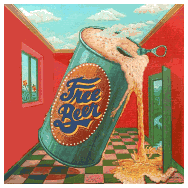 Free Beer "Free Beer" (Southwind Records, 1975) (LP)
Free Beer "Free Beer" (Southwind Records, 1975) (LP)
This New York City band got together in 1974, with bandmembers Sandy Allen, Michael Packer and Robert Caleb Potter shifting direction and "going country" after the demise of Allen and Packer's previous band, the psychedelic/pastoral folk-rock band Papa Nebo. Potter brought some Nashville country cred to the band, having written a song that rising star Barbara Fairchild recorded for one of her early albums. This indie-ish debut landed them a contract with RCA, though things never quite clicked with the band chartwise... Studio picker Eric Weissberg adds a few licks as well.
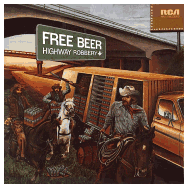 Free Beer "Highway Robbery" (RCA, 1976)
Free Beer "Highway Robbery" (RCA, 1976)
(Produced by Alan Lorber)
The singing, songwriting trio of Sandy Allen, Michael Packer and Robert Caleb Potter are augmented by a few studio musicians, including steel guitarist Dan Daley, and some guy on bongo drums. But even with a few 'Seventies affectations, this is a pretty pleasant country-soft pop set, with a few too-lofty arrangements, but overall a reasonably earthy set with a cheerful cowboy-poet undercurrent. Occasionally they lapse into disco-tinged AOR (as on the breezy "Uptown Lover") but fans of easygoing country-rock will enjoy this album. All but one of the songs were written by the bandmembers -- apparently they didn't write together, but they had a lot of original material to work with.
Free Beer "Noveau Chapeau" (1977) (LP)
Free Beer "Best" (Iris Music, 2011)
A best-of collection drawing on the three albums listed above... Nineteen tracks in all; seems like a pretty generous selection!
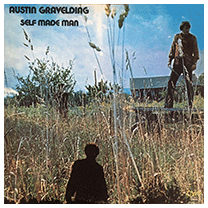 Austin Gravelding "Self Made Man" (GWP Records, 1970) (LP)
Austin Gravelding "Self Made Man" (GWP Records, 1970) (LP)
(Produced by Andy Wiswell)
Oddball early 'Seventies folk-pop poetics from a songwriter out of Ithaca, New York who was working in roughly the same hard-to-categorize terrain as Lee Hazelwood, not still folk, not quite pop, maybe a little bit country. Owned by an entrepreneur named Jerry Pursell, GWP was the same odd, idiosyncratic, short-lived label that put out a series "Astromusical House" records that capitalized on the hippie-era astrology craze -- with one full LP devoted to each sign of the zodiac... So if you knew someone who was a Taurus, or a Libra, or a Sagittarius, or whatever, you could buy them "their" album -- or better yet, you could buy one for everyone in the family! This might not ring a bell for you young'uns, but trust me: for a while they were everywhere, and doubtless helped create the revenue stream that enabled Pursell to also sign artists such as Gravelding.
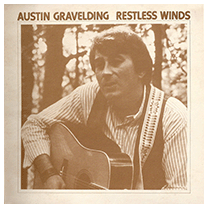 Austin Gravelding "Restless Winds" (GWP Records, 1971) (LP)
Austin Gravelding "Restless Winds" (GWP Records, 1971) (LP)
(Produced by Andy Wiswell)
Though honestly still kinda painful to listen to, this second album has a fuller, less folkish sound, with assertive pop arrangements on a few tracks, and more distinct country motifs on others, in particular a pretty good hippie-rock steel player, and some decent banjo picking on a track or two. Unfortunately none of the backing musicians are identified, so who knows... right? Still a bit too gooey and meandering for me, but fans of freak-folk or soft rock, etc., might get a kick out of this stuff.
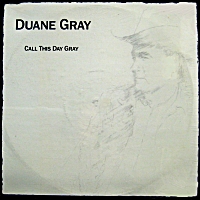 Duane Gray "Call This Day Gray" (EJ Records, 1986) (LP)
Duane Gray "Call This Day Gray" (EJ Records, 1986) (LP)
(Produced by Duane Zaloudek & Eddie Joy)
Here's one that's got a more-interesting-than-usual back story... Duane Zaloudek (aka Duane Gray) was a reasonably well-known abstract and modernist painter of the post-WWII era who also moonlighted as a country singer, leading a for-real twangband in New York City during the early 1980s. Born in Oklahoma back in 1931, he grew up in Oregon and moved around quite a bit, including a stint in the Air Force during the Korean War. Zaloudek's musical roots go back to his school days in the late 1940s, when he sang topical folks songs at labor union rallies, though he'd upped the ante and formed his own country band by the time he moved to New York. In his late-1960s heyday, Zaloudek produced a series of maybe-not-so-abstract, erotically charged geometric paintings that were said to extol the Tibetan tantric yoga practice known as karmamudra, though the seemingly drab, sketchy artwork on this album cover is perhaps more reflective of the more minimal approach his work took in later years. At any rate, this has an interesting song selection: you've got your traditional cowboy stuff like "Red River Valley," some classic country hits such as Eddy Arnold's "Make The World Go Away" and Ernest Tubb's "Waltz Across Texas," a more modern songs by Terry Allen, Billy Joe Shaver, and a couple of Zaloudek originals, "Call This Day Gray" and "Sally Hit And Run." Generally speaking, this is a pretty solid set, though his likeness (or debt) to fellow artsy-fartsy twangster Terry Allen makes Gray's exaggerated drawl and seeming musical dilettante-ism feel like it's a bit too on the nose. Regardless, though, this is a pretty good album. The backing band included Rick Hozza on guitar, Slats Kluge (piano), Loren Robert Kluge (backing vocals) and Sprocket J. Royer playing bass; Hozza and Zaloudek also collaborated with Tom Wesselmann, a fellow modern artist who also enjoyed playing country music. As far as I know, this is the only "Duane Gray" album.
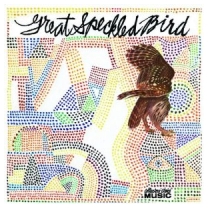 Great Speckled Bird "Great Speckled Bird" (Bearsville Records, 1970) (LP)
Great Speckled Bird "Great Speckled Bird" (Bearsville Records, 1970) (LP)
(Produced by Todd Rundgren)
Canadian folk-pop icons Ian & Sylvia Tyson "went country" on this experimental album, which featured musical assistance by blues-roots guitarist Amos Garrett and steel player Buddy Cage, as well as the Bearsville label's own "wrecking crew" of guitarist Jim Colegrove, piano player Jeff Gutcheon and drummer N.D. Smart, who formed the band Hungry Chuck in 1971, just as Great Speckled Bird was running out of steam... Only briefly in print, this is considered by many to be a landmark album from the early years of the country-rock genre.
 Great Speckled Bird "You Were On My Mind" (Columbia Records, 1972) (LP)
Great Speckled Bird "You Were On My Mind" (Columbia Records, 1972) (LP)
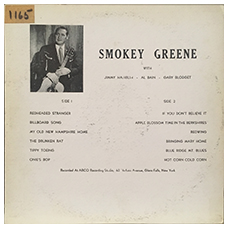 Smokey Greene "...With Jimmy Hamblin, Al Bain, Gary Blodget" (Green Mountain Records, 1967-?) (LP)
Smokey Greene "...With Jimmy Hamblin, Al Bain, Gary Blodget" (Green Mountain Records, 1967-?) (LP)
Legend has it that East Coast old-timer Walter George ("Smokey") Greene hosted the first bluegrass festival in New York State, way back in 1972, although by that time he had already been a fixture on the New England country scene for many years. Born in Tinmouth, Vermont in 1930, Mr. Greene settled on the other side of the state line around Glens Falls, New York, taking a day job with the Schuylerville school district, while moonlighting with his band The Green Mountain Boys, opening a music club in 1966, and founding the Corinth, NY music festival, which he ran for over sixteen years. Although seen as a bluegrasser, his musical roots stretched back to an earlier, pre-Monroe-vian era of sentimental mountain songs and blues yodelers such as Jimmie Rodgers and Cliff Carlisle, who were his early idols. In 1946 he briefly landed a gig playing banjo for Slim Clark, though soon after he enlisted in the Air Force, eventually getting stationed in Fairfield, California, where he formed a band and cut his first single, back in 1956. After leaving the military, Greene moved back east and gravitated towards bluegrass music, opening a nightclub in Thompson, NY that became a way station for various musicians during the 'Sixties and 'Seventies. This generic-looking but super-groovy LP seems to have come out in the late 1960s (as seen by the inclusion of "Tippy Toeing," which was a hit for the Harden Trio in 1967). Smokey Greene had a remarkably long musical career, launching a 2015 "farewell tour" that found him still performing locally as recently as 2019... [Thanks to Discogs for their extensive biographical entry on Greene and his career.]
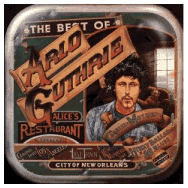 Arlo Guthrie "The Best Of Arlo Guthrie" (Warner Brothers, 1977) (LP)
Arlo Guthrie "The Best Of Arlo Guthrie" (Warner Brothers, 1977) (LP)
A nice best-of set that includes most of his best-known songs, and a couple of off-the-radar tunes as well. It kicks off with Arlo's sprawling, freakulent shaggy-dog classic, "Alice's Restaurant Massacree," and adds "The Motorcycle Song," the bouncy smuggler's ballad, "Coming Into Los Angeles," and several soulful acoustic tunes such as the mournful "Last Train," "Darkest Hour," and his big hit version of Steve Goodman's "City Of New Orleans." It's a modest set, though, and could be longer -- mostly what I'd like to have added is my other Arlo Guthrie fave, "Hobo's Lullaby," although I guess in an age of digital downloads, that's less of a bummer than it used to be. This is a good introduction to Guthrie's work and probably for most listeners about as much of it as they'll need. Sweet stuff, though.
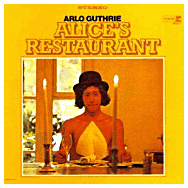 Arlo Guthrie "Alice's Restaurant" (Reprise Records, 1967)
Arlo Guthrie "Alice's Restaurant" (Reprise Records, 1967)
Arlo's first album. If the truth be told, there was a time in my life when I was able to recite "Alice's Restaurant" word for word, even the Don Bowman cover version. But those brain cells are gone now. Probably just as well. Also includes the original, less fun, studio version of "The Motorcycle Song," and several folk-psychedelic songs that aren't all that memorable, although they did reveal the young Mr. Guthrie as a surprisingly mature, self-possessed musician, especially for someone as stoned as he must have been at the time.
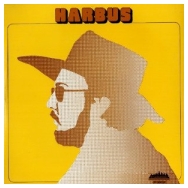 Neil Harbus "Harbus" (Evolution Records/Stereo Dimension, 1973)
Neil Harbus "Harbus" (Evolution Records/Stereo Dimension, 1973)
(Produced by Neil Portnow & John Miller)
In the early '70s, the lines between country-rock, pastoral folk and soft-pop were pretty porous, as heard on this sunshine-y album by New York state songwriter Neil Harbus... The opening tracks bring Jonathan Edwards and Cat Stevens to mind, though he slides into a more distinctly rural vibe on songs such as "Memphis To Nashville," "Country Song," and "Arizona." Mostly, though, this has a contemplative singer-songwriter/chamber folk feel, particularly suited to Cat Stevens fans, with several songs that hint at Christian spirituality, although he doesn't really hit you over the head with it. Hank DeVito plays pedal steel, though most of the studio crew aren't as country-oriented... Still, the gentle vibe on his twang tunes is nice... A soft, subtle record that's worth checking out, but definitely more "pop" than country: of the non-country tunes, "Open The Door" is a standout. I think this was his only record... anyone know for sure?
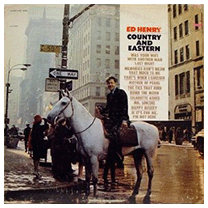 Ed Henry "Country And Eastern" (Epic Records, 1967) (LP)
Ed Henry "Country And Eastern" (Epic Records, 1967) (LP)
(Produced by Ed Labunski)
A tongue-in-cheek "country" album of novelty tunes ala Roger Miller, including tracks such as "Cigarette Ashes," "Happy Misery," "Was Your Wife With Another Last Night" and "Bomb The Moon." Turns out Ed Henry was the nom du twang of singer-composer Edward H. Labunski (1937-1980) a real-live 1960s New York City ad-man who wrote pop tunes on the side as well as this exercise in high-concept cornpone comedy with some pretty good pickiers behind him. Nicknamed "the Polish cowboy," Labunski was a highly successful jingle writer who penned and performed several high-profile nationwide ads for several big brands, including a notably wacky '70s tongue-twister for Chevy, “Baseball, Hot Dogs, Apple Pie and Chevrolet," along with other Clio-winning themes. He later got into hard rock and recorded an album with Lonnie Mack which, sadly, went unreleased after a tragic car crash took Labunski's life in 1980. The same basic story's been told on several websites, though the rootsrockweirdo blog tells it well. All in all, not a bad album... and one heck of a backstory!
John Herald - see artist discography
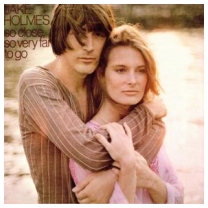 Jake Holmes "So Close, So Very Far To Go" (Polydor Records, 1970) (LP)
Jake Holmes "So Close, So Very Far To Go" (Polydor Records, 1970) (LP)
(Produced by Elliot Mazer)
This rambling orchestral pop-folk odyssey doesn't really fit in with the whole "hippie country" sound, but I'm adding it here more as a "buyer beware" thing, since it was recorded in Nashville and features a bunch of talented country super-pickers in the backing band. We're talking about folks like Kenny Buttrey, Norbert Putnam, Buddy Spicher and Weldon Myrick, so you can see why I had to check it out. Holmes was a graduate of the Greenwich Village folk scene who made a few oddball, experimental folk-pop-psych albums, and is best remembered as the guy who wrote the song "Dazed And Confused," which British rock guitarist Jimmy Page brazenly stole from Holmes after hearing him play it during a gig where Holmes opened for the Yardbirds. (Page never gave Holmes credit for the work, despite Holmes having recorded it two years before Led Zeppelin, and the issue wasn't settled until Holmes filed suit in 2010...) Later on, Holmes went into advertising and composed several well-known jingles... Anyway, this is one of those weird hippie-era pastoral pop albums that you really have to be into on a cerebral level -- it's certainly no alt-country twangfest, although on a couple of tracks the pedal steel makes a nice impression, notably on "The Paris Song," although it's still a stretch to think of it as "country-rock." Probably of more interest to fans of experimental, late '60s studio pop.
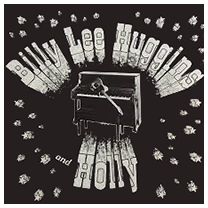 Billy Lee Huggins & Holly "Billy Lee Huggins And Holly" (Artist House Records, 1985-?) (LP)
Billy Lee Huggins & Holly "Billy Lee Huggins And Holly" (Artist House Records, 1985-?) (LP)
In his teenage years, Billy Lee Huggins was a rockabilly rebel from Saranac Lake, in upstate New York... At one point he headed to Nashville to make it big, and wound up playing backup for a while, but mostly his career was spent in Clinton County, NY, where he led bands in the '60s, '70s and '80s. Many years later he cut this album, which features robust, soulful vocals in an old-Elvis/Charlie Rich country crooner style. The exact date this album came out is a little mysterious, but it was probably around 1985, since he covers "Mona Lisa Lost Her Smile," which was a big hit for David Allan Coe in '84. In addition to this obscuro album, Huggins also cut a 1977 single on the Nashville-based indie label, Phono Records, although he was back in Saranac Lake by at least 1982, playing county fair-type gigs with "Miss Holly" and a local guy named Carl Chiasson. Later on, Huggins got religion and started his own ministry, which included a self-released gospel album which he sold locally as a CD.
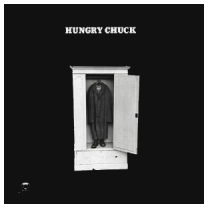 Hungry Chuck "Hungry Chuck" (Bearsville Records, 1971) (LP)
Hungry Chuck "Hungry Chuck" (Bearsville Records, 1971) (LP)
After folk stars Ian & Sylvia Tyson tried their hands at country-rock, several musicians from their short-lived Great Speckled Bird band formed Hungry Chuck as a way to further explore the group's eclectic style. Jim Colegrove, Jeff Gutcheon and N.D. Smart formed Hungry Chuck in 1971, and released this lone album, with a mix of roots music styles that included folk, blues, country and gospel, reflecting the open-minded, experimental vibe of the times.
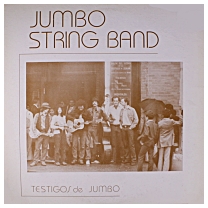 Jumbo String Band "Testigos De Jumbo" (Dreamland Studio, 1980) (LP)
Jumbo String Band "Testigos De Jumbo" (Dreamland Studio, 1980) (LP)
(Produced by Billy Clockel)
An eclectic string-swing band from New York State, these peeps were more in the folkie side of things, though they included versions of country-rock staples such as "Love Has No Pride," "The Night They Drove Ol' Dixie Down" and "Take It Easy." The group included mandolin picker Keith Baumann, Larry Brittain (guitar), Billy Clockel (bass), Jim Coleman (banjo), and Lisa Gutkin on fiddle, along with various and sundry others chiming in... Later in the decade they recorded a coupe fo albums for the Old Homestead bluegrass label.
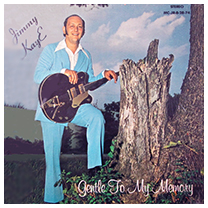 Jimmy Kaye "Gentle To My Memory" (1974) (LP)
Jimmy Kaye "Gentle To My Memory" (1974) (LP)
(Produced by Louie Swift)
James J. Kaminski, aka Jimmy Kaye (1942-1995) was a country singer from upstate New York, leading a band called the Mountain High from the late 1960s throughout the '70s. He performed regionally in New York State and in Canada, and released this album as well as a single of the title track... Most of the songs appear to be originals, although there are no songwriter credits... These are mostly cover tunes, though the title track was an original, written by Doug LaValley.
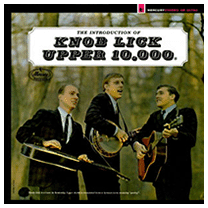 Knob Lick Upper 10,000 "The Introduction Of Knob Lick Upper 10,000" (Mercury Records, 1963) (LP)
Knob Lick Upper 10,000 "The Introduction Of Knob Lick Upper 10,000" (Mercury Records, 1963) (LP)
This folk-bluegrass trio were signed by Dylan's manager Albert Grossman and swung a major label deal which resulted in two albums and frequent, high-profile gigs in the New York folk scene... The band included Dwain Story, nephew of bluegrass great Carl Story, along with Pete Childs and -- perhaps most notably -- future folk-rock producer, Erik Jacobsen, who got into rock'n'roll and produced albums by The Lovin' Spoonful and Tim Hardin before hitting the West Coast scene, where he worked with California artists such as the Charlatans and Norman Greenbaum... But it all started out with a little bluegrass twang!
Knob Lick Upper 10,000 "Workout!!!" (Mercury Records, 1963) (LP)
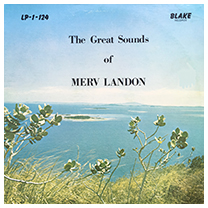 Merv Landon "The Great Sounds Of Merv Landon" (Blake Records, 197-?)
Merv Landon "The Great Sounds Of Merv Landon" (Blake Records, 197-?)
(Produced by John Cook)
A pleasantly low-rent indie album from Merv Landon, an auto mechanic (and muffler shop owner) from Elmira, New York with a private passion for singing old-school country music. He wasn't a dazzling singer, though his vocals plausibly fall in the range of milquetoasty crooners like Hank Locklin or Hank Snow... Landon traveled down to Nashville to record this album -- sadly, the studio musicians aren't listed, but you can tell they were a talented group, even if their performances lapse into indifference from time to time. The album opens on a slightly Jimmy Buffet-ish note with the song "Caribbean," moving into better-known hits such as "For The Good Times," "Does My Ring Hurt Your Finger," "Me And Bobby McGee" and Marty Robbins' "Devil Woman," and even a few mega-oldies like "Ghost Riders In The Sky" and "Chattanooga Shoe Shine Boy." Nothing earthshaking, just a nice, sincere amateur album from an average guy with a love of plain, old country twang.
Ken Lauber "Contemplation (View)" (Polydor Records, 1970) (LP)
(Produced by Elliot Mazer & Wayne Moss)
I have seen this album described as "the first countrypolitan album," or "the first countrypolitan concept album," or some such grandiose claim, but considering that it came out as late as 1970, I think we can take that with a grain of salt. Certainly, though, there's a lot of legit twang on here, including a wealth of talent from the "Nashville Cats" Music City A-team, including superpickers such as Kenny Buttrey, Mac Gayden, Charlie McCoy, Wayne Moss, Weldon Myrick and Pete Wade, as well as Ken Lauber on piano and vocals. He might have been born n New York City, but Mr. Lauber -- who later did some soundtrack work -- did have an affinity for rural-sounding roots music. All the songs on here are his own tunes, except for one track, "Mama, It's Such A Long Ride Home," which was written by Happy Traum.
Ken Lauber "Ken Lauber" (Decca Records, 1971) (LP)
(Produced by Val Garay, Dave Hassinger & Rick Heenan)
On this sometimes-funky set, Lauber digs deeper into rural roots, backed by a motley cast of characters on the periphery of the country-rock scene. There are some Wrecking Crew-adjacent LA studio hotshots such as Larry Carlton and bassist Max Bennett, as well as Joe Osborn (who was in Michael Nesmith's country-rock band at the time) and guitarist Mike Deasy, who was pursuing country-ish threads in his own solo work and as part of the band Gator Creek. Understandably resurrected in several international reissues, this album is certainly emblematic of the eclectic wandering of early 'Seventies scene, with a number of tracks that bring to mind the syncretic vibe of The Band, as well as iconoclasts like Larry Jon Wilson and Leon Redbone, et.al. Lauber frequently goes overboard, for sure, and the lyrics lapse into the poetic incoherencies of the time, but overall it's a pretty cool record, especially for fans of hippie-era roots music.
 David Lazerson "Take Me Home" (Mark Custom Records, 1982-?) (LP)
David Lazerson "Take Me Home" (Mark Custom Records, 1982-?) (LP)
Not your usual country record, for sure. Hailing from Buffalo, New York, singer David Lazerson combines Jewish religious themes with solid rural picking... This album includes banjo, mandolin and pedal steel, though the lyrics exalt Nature (with a capital "N") and hint at an ecstatic, if not overtly messianic spiritual vision. Lazerson worked extensively with his local Boy Scout troop, an also served as a music and activities director for a regional Jewish summer camp, earning him the nickname "Reb Nature." He was serious about his musical endeavors, and performed in the East Coast folk scene, sharing the stage with Theodore Bikel, Jan Peerce, and others.
Birdie Lee & Al 'Porky' Witherow "Duo Dynamite" (Artic Records, 1974) (LP)
(Produced by Loryn Atwell)
Originally from West Virginia, "Miss Birdie Lee" was living in upstate New York when she joined singer Al Witherow's group, the Country Mystery, learning to play bass in order to fill an open slot in the band. On this album they mostly sang duets in a kind of old-school style reminiscent of country duos like Carl Butler & Pearl or the Mosbys, and less like the slicker-sounding stars of the day, such as Conway and Loretta. The band included Lee's husband Dallas Eugene on drums, bassist Roger Ray, fiddler June Eikard ("Canada's Lady Of The Fiddle"), pianist Wayne Sexton, Dee Woodmore on lead guitar and Buddy Gregory playing pedal steel. The musical backing is also a little rough around the edges, in a way that I find appealing -- there was genuine twang in here, as well as a degree of amateurism that's kind of appealing, particularly given the direction country was headed in at the time... Definitely worth a spin!
Birdie Lee "Comin' Atcha" (Arctic Records, 1974) (LP)
On her first solo album, Ms. Lee mostly sang cover songs, but she had a nice rural sound, a little rough around the edges in a way that was refreshing for the countrypolitan era... She's got kind of an early-Loretta/Brenda Lee vibe and, despite obvious debts to numerous bigger stars, she has her own distinctive sound. As on the other album recorded around the same time, there's a nice twangy feel to these tracks... If you'd like to hear alternate versions of big hits by '70s stars such as Barbara Mandrell, Tammy Wynette and Barbara Fairchild, you might get a kick out of this disc.
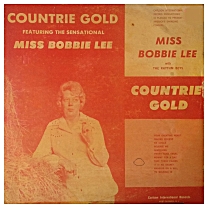 Miss Bobbie Lee & The Rhythm Boys "Countrie Gold" (Carlson International, 1962) (LP)
Miss Bobbie Lee & The Rhythm Boys "Countrie Gold" (Carlson International, 1962) (LP)
I have absolutely no idea why they insisted on spelling it "countrie," but this obscuro private pressing LP certainly has its charms. Wendy Maye Hummel (aka Bobbie Lee) was a middle-aged gal from rural New York state who was born in West Stockton, and recorded this album in Kingston, NY. According to the liner notes, she was apparently encouraged to record this album by her husband and daughter and "the many thousands of fans" who made up her "sellout audiences." Lee sings like Kitty Wells -- with the same rural snap, although actually not as grating as Wells -- and though both she and the modest backing band have a fairly low energy level, it's real country music, and nice to hear a true amateur singing her heart out. The songs are probably all cover tunes, leaning heavily on hits by Kitty Wells, Hank Williams and Lefty Frizzell, although the last track, "I'm Walking In," might have been an original. There are no credits on the album for composers, backing musicians, or even the release date... I'm guessing the early 1960s, though a 1976 newspaper article (that repeats some the liner notes verbatim) says it was "brand new" in '76, but also mentions a promo record from 1962. I'm betting it really came out in '62 but was being passed off as new a decade later. Anyway, let's hear it for New York... Ms. Lee, who in the 'Seventies ran a nursing home for severely disabled adults, clearly wasn't really a player in the industry, but she did record a charming souvenir album, and probably got a lot of joy out of singing.
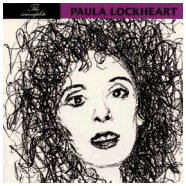 Paula Lockheart "The Incomplete Paula Lockheart" (Flying Fish Records, 1979) (LP)
Paula Lockheart "The Incomplete Paula Lockheart" (Flying Fish Records, 1979) (LP)
NYC-based blues/swing pianist Paula Lockheart evoked the classic work of 1940's slick clicks such as Lil Green and Julia Lee, with sly, lusty romps through a lively mix of cover songs and original material. Mostly on the jump blues and swing-jazz tip, but with a healthy bit of old-school twang in there as well, particularly in the rollicking "Boogie Woogie Country Girl," a tune I heard a bazillion times on KFAT radio, back in the olden days. Fans of Marcia Ball, Asleep At The Wheel and the artists they admired will probably find this disc to be lots of fun as well. This is a pretty sweet collection of her work - fun, rambunctious blues boogies that'll get your toes a-tappin' every time. (PS - Here's an interesting aside: apparently Ms. Lockheart went on to found LockMusic, the company that started the Music Together arts program for pre-K toddlers... I will dedicate my next scarf dance in her honor!)
 Dody Lynn & Bob Flower "Bob Flower And His Star Dusters" (Do-Re-Me Records, 1965) (LP)
Dody Lynn & Bob Flower "Bob Flower And His Star Dusters" (Do-Re-Me Records, 1965) (LP)
Country bandleader Bob Flower had a day job as police chief of Cuba, New York, but he kept busy at nights, taking his band on the road to play gigs and even made the trek to Nashville a few times to cut singles, as well as this LP, which was his only full-length album. Flower described himself as "the poor man's Ernie Ford," and is firmly anchored in mainstream, old-school country. This album is almost all cover tunes, standards like "Cold, Cold Heart," "Four Walls," "Lonesome 7-7203" and the like. Flower sings half the songs solo, as well as a couple of duets with "girl" singer Dody Lynn who was a Cuba, NY native... Ms. Lynn also sings lead on a couple of tracks, including a version of "It Wasn't God Who made Honky Tonk Angels." Apparently Flower retired from the police force in 1966, and moved to Florida in the early '70s to retire -- Dody Lynn established herself as a solo performer, playing gigs around Cuba with a band called the Guitarmen.
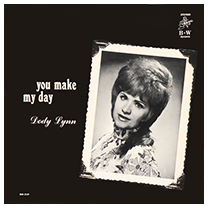 Dody Lynn "You Make My Day" (B-W Records, 1973) (LP)
Dody Lynn "You Make My Day" (B-W Records, 1973) (LP)
As far as I know, this was Dody Lynn's only solo album, released in the early '70s when she was playing local gigs with her band, the Guitarmen.
The Jerry Madore Show "When I Seem To Miss You The Most" (Trackdown Recording Studios, 1983-?)
Though French-Canadian by birth, country singer Jerry Madore started his musical career in New England, way back in 1945, performing with his band The Prairie Ramblers on a tiny radio station up in Berlin, New Hampshire, then eventually settling down in New York state, where this album was recorded. It's a curious affair. The oddest thing is the sorta-kinda identification of the musicians backing him, who are listed by first name or initials only: Jerry Madore is credited as lead singer and guitarist, while "John" plays the drums, a gal called "T.R." is the bassist, and "Tim" plays banjo and guitar. Your guess is as good as mine. A mix of oldies and newer tunes, this appears to have been Mr. Madore's only full album, though he also released a few singles in earlier years.
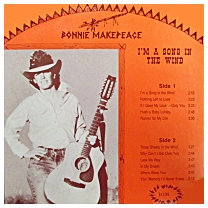 Bonnie Makepeace "I'm A Song In The Wind" (19--?) (LP)
Bonnie Makepeace "I'm A Song In The Wind" (19--?) (LP)
I could find very little information about this 12-string strummin' gal or about this album, which I believe was her only record. She was originally from Canadaigua, New York, and played there from the mid-1970s to at least the mid-'80s, playing at rodeos and county fairs, as well as venues such as the Lakeview Inn and the California Ranch nightclub. She sang traditional folk and country songs, but was also a prolific songwriter, copyrighting over a hundred songs during her career. She may have moved to Wyoming by the time this record was made, though, again, it's hard to pin down much information about the album itself.
 Happy Mann & The Country Squires "Fairways Lounge Presents..." (Mark Records, 1970-?) (LP)
Happy Mann & The Country Squires "Fairways Lounge Presents..." (Mark Records, 1970-?) (LP)
(Produced by Vern Batt)
Pure lounge-band country by a band from Buffalo, New York... Bandleader Happy Mann had a regionally successful band from the late 1950s through the '60s and beyond. I'm guessing this album -- which features backing by a bunch of younger guys -- came out around 1970, since it includes covers of "Statue Of A Fool" and "Proud Mary" which both were hits in 1969. There's one Mann original on here, the novelty-oriented "Coupon Song," though mostly this was a honkytonk/country ballads oriented set. Mann also cut some square dance singles, though this album's a real-deal country record.
 Bobbie McGee "Bread And Raises: Songs For Working Women" (Collector Records, 1981) (LP)
Bobbie McGee "Bread And Raises: Songs For Working Women" (Collector Records, 1981) (LP)
(Produced by Joe Glazer & Barbara Wren)
Straight-up political folk music, and not much of a country record... But come on: it's by a gal named Bobbie McGee? The same as in one of the most widely-recorded country songs of the early 'Seventies? I mean, sure, this New Yorker's real name was Barbara Wren, but still: cool stage name. This is a straightforward set of labor-movement folk songs zeroing in on the struggles of working women, with earnest versions of several great songs, including more contemporary faves such as Peggy Seeger's "I'm Gonna Be An Engineer," Fred Small's "Fifty Nine Cents" (about the gender-based pay gap, which still hasn't been closed) and Willie Sordill's "Please Tip Your Waitress." Also, plenty of old classics like "Bread And Roses," "Union Maid" and "Solidarity Forever." And circling back to the country world, there's even a cover of Dolly Parton's "Nine To Five." And Ms. McGee got paid to sing this stuff? What a way to make a living! The arrangements are pretty stripped-down and basic, although there are a few high-powered bluegrass pickers on board, notably Mike Audridge on dobro and steel, Alice Gerrard singing harmony, and Phil Rosenthal plucking the banjo, guitar, mandolin, and anything else that wasn't nailed down. Not country music, really, but a fine resource for the topically-minded.
 Bat McGrath & Don Potter "Introducing..." (Epic Records, 1969) (LP)
Bat McGrath & Don Potter "Introducing..." (Epic Records, 1969) (LP)
This duo from upstate New York only made a few little ripples at the time this album came out, but later on songwriter Bat McGrath and guitarist Don Potter each made big waves in the worlds of Top 40 Country and Pop... McGrath worked as a lyricist for a then-unknown Chuck Mangione, while Potter worked his way into the Nashville elite, becoming best known as the producer behind the slick, synthy sounds of The Judds. McGrath also had a country side (as heard in his solo stuff below) and also moved to Nashville where he became a successful Top Country songwriter...
 Bat McGrath "From The Blue Eagle" (Amherst Records, 1976) (LP)
Bat McGrath "From The Blue Eagle" (Amherst Records, 1976) (LP)
Acoustic-based 1970s folk-rock/AOR with a definite country touch... McGrath had earlier been in a duo with Don Potter, but appears here as a solo artist (even though Potter was on board as a supporting musician...) Nice stuff that coasts between country-rock and rootsy singer-songwriter terrain... Certainly worth a spin!
 Bat McGrath "The Spy" (Amherst Records, 1978) (LP)
Bat McGrath "The Spy" (Amherst Records, 1978) (LP)
The music shifts here, focussing more clearly on a soft-pop sound, closer to Jackson Browne and the softer side of the Eagles, and further away from folks like Jonathan Edwards. A little bland, to be honest, and somewhat same-y and monotonous. Oh, well.
Mike McGuirk "Country Feelings" (FMA Records, 1980) (LP)
(Produced by Jack Boles & Mike Schiffman)
Not to be confused with the WWF announcer, Michelle ("Mike") McGuirk, this fella from Long Island, New York came to producer Jack Boles' attention and they booked time at Richey Studios, in Nashville to cut an album which is about half classics, half originals. McGuirk penned several songs, including "Crazy Baby," "I Can't Believe (You're Callin' My Name Again)," "Lookin' For An Angel," "You're The Only One For Me," and "With No One To Care (When I'm Lonely)," which was co-written with his mother, Ida Frances McGuirk. As if that wasn't charming enough, Boles mentions in his liner notes that Mr. McGuirk had campaigned long and hard to get old-timer Elton Britt a spot in Nashville's country music walkway of fame. Aw. He's backed here by a band at least partly made up of Music City A-Listers: Fred Newell, Willie Rainsford, The Cates Sisters... As far as I know, this was McGuirk's only album, but he was sure keeping some nice company!
 McKendree Spring "Too Young To Feel This Old" (Pye Records, 1976) (LP)
McKendree Spring "Too Young To Feel This Old" (Pye Records, 1976) (LP)
(Produced by Mark London)
The seventh album by this folk-rock band from New York... Mostly, this is a commercially-leaning 1970s soft-pop set with distinctly country-rock riffs in the mix. They sound a lot like Top Forty bands such as Firefall and Poco, as well as the mellower, mid-'70s Neil Young, tempered by traces of the progressive folk sound of Fairport Convention. Although there are a few lightly avant touches (notably a six-minute long fiddle medley by Michael Dreyfuff) the overall aim is pretty mainstream and easy accessible. Sounds nice, too, though it may be less challenging than their earlier records.
 Freddie McLean "Meet Freddie McLean And The MacBrothers Band" (UCA Records, 19--?) (LP)
Freddie McLean "Meet Freddie McLean And The MacBrothers Band" (UCA Records, 19--?) (LP)
(Produced by Freddie McLean & Bob Yauger)
A self-described "bunch of good 'ole boys from up state New York," this Utica-area band featured Freddie McLean McLean on fiddle and guitar, along with Jack Barlow (piano), Bob Gardner (drums), Hank Honebein (drums) and Danny Roberts playing bass. The repertoire was mostly cover songs, along with two originals, "Devil On Your Shoulder" and "Yukon Jack," penned by McLean. The set list includes gems from Charlie Daniels, Buck Owens, Peter Rowan, Hank Thompson, with a surprising amount of material about the South, songs like "Dixie On My Mind," "South's Callin' Me," and "The South's Gonna Do It Again," as well as the stoner anthem, "Panama Red." There's no date on the album, though it looks late '70s/early '80s; McLean was still doing local shows around Syracuse and Oneida as late as the 1990s, though after that the trail grows cold.
 Mirinda "Mirinda" (National Foundation Records, 1982) (LP)
Mirinda "Mirinda" (National Foundation Records, 1982) (LP)
(Produced by Johnny Dollar, Jack Logan & Bill Vorndick)
Ten-year old Mirinda (no last name given; kind of a Cher/Prince thing, I guess...) was from upstate New York, and she must have had some fierce stage parents behind her, because prior to recording this album she had already won an award at the Colorado Country Music Convention, and earlier on had auditioned and was a finalist for a role in the Broadway production of "Annie." Her folks also took her down to Nashville, where she recorded this set with a studio crew that included A-list musicians such as Mark Casstevens, Tony Migliore and Weldon Myrick. It looks like this was some kind of song poem/demo album, with a bunch of material from mostly-unknown composers -- there's one song called "Hank The Opry Mouse" which was written by '60s singer Hugh X. Lewis, but other than that, this is strictly obscurosville.
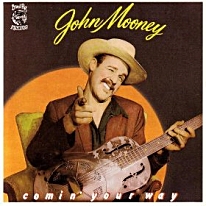 John Mooney "Comin' Your Way" (Blind Pig Records, 1979) (LP)
John Mooney "Comin' Your Way" (Blind Pig Records, 1979) (LP)
Fun acoustic blues from a guy originally from upstate New York, but later part of the New Orleans scene. Mooney went in a more "urban blues," electrified direction in the '80s, but this debut disc has a nice funky, rootsy feel that keeps it in the indiebilly camp, at least in my fevered mind. Kind of fits into the whole George Gritzbach/Bob Brozman/Dan Hicks continuum... Plus, you gotta love that National steel guitar sound!
Lee Moore -- see artist profile
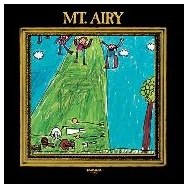 Mt. Airy "Mt. Airy" (Thimble Records, 1973) (LP)
Mt. Airy "Mt. Airy" (Thimble Records, 1973) (LP)
(Produced by Bob Hinkie)
An intriguingly eclectic collaboration between singer-songwriter Tom Chapin (Harry's brother!) and folk/bluegrass multi-instrumentalist Eric Weissberg. There are a few softer folk-grass tunes on here, but this album is more insistently an experimental-psychedelic set, with Weissberg's banjo pushed into some very interesting rock arrangements... There's a hippie-dippy edge, to be sure, but also some very creative musicmaking. Definitely worth a spin!
Maria Muldaur - see artist discography
Geoff Muldaur - see artist discography
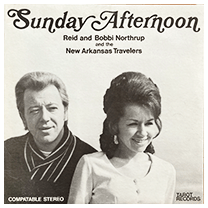 Bobbi Northrup & Reid Northrup "Sunday Afternoon" (Tarot Records, 19--?) (LP)
Bobbi Northrup & Reid Northrup "Sunday Afternoon" (Tarot Records, 19--?) (LP)
(Produced by Tony Balunas)
A charmingly rough-edged (yet ambitious) set of regional twang by a husband-wife duo who were active in the Northwestern country music scene. The Northrups were from East Berne, New York (near Schenectady) and performed with various backing bands for many years in the late '60s and early '70s, most notably this group, the New Arkansas Travelers, which also included Dick Spensley, Tony Spadero and John Cefala. The Northrups also acted as officers in Eastern States Country Music, Inc., a boosterism group that also included Doc Williams, and were in the general orbit of the WVVA Wheeling Jamboree. By the early 'Eighties, Mr. Northrup had retired from the stage and moved into a top position with the Altamont Fair, managing the three-county venue up through the 1990s, when an economic downturn led to a falling out with the fair's board of directors. As tensions mounted, Mr. Northrup retired and moved to Florida, where he passed away in December, 2000. As far as I know, this was their only album, but it's a doozy. It opens with a gloriously flawed rendition of "Jackson," where both singers flub their delivery, and seem to forget the lyrics while their hotshot guitarist keeps the hot licks coming. There are nods to Johnny Cash, hints of Dave Dudley, covers of Merle Haggard, Hank Williams and Mickey Newbury, as well as a slew of original tunes. The album includes two songs credited to Reid Northrup (the death-row dirge, "13 Steps" and "Knock Knock") and a couple by guitarist Dick Spensley ("Jody," "Restless Kind"), as well as one other possible original, "Short And Sweet," by B. Slater. All in all, a fine example of "real people" regional twang, with some lively, committed performances, particularly my Bobbi Northrup, who combined a mousy little voice with a wicked, Wanda Jackson-style snarl. Fun stuff!
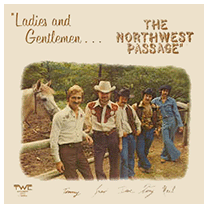 The Northwest Passage "Ladies And Gentlemen... The Northwest Passage" (TWC Records, 1977) (LP)
The Northwest Passage "Ladies And Gentlemen... The Northwest Passage" (TWC Records, 1977) (LP)
(Produced by Walter Balderson, Jerome Haggart & Doug DiFranco)
A twangband apparently from Long Island, New York, Northwest Passage seems to have recorded two albums worth of material down in Nashville, this one and a second disc released under the name of singer Tommy Blue. As on that album, they included material by an R. Sanders, as well as several songs by guitarist Neil Hartmann and steel player Fred Hartmann, Junior. Also in the group were Tommy Blue, pianist John Carlten (ne John C. Chumbley), drummer Tony Casilli, and Ron McLaughlin on bass. Couldn't find a lot of info about these guys, but I'll keep pokin' around.
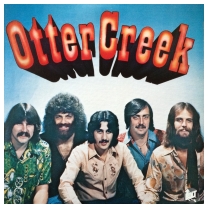 Otter Creek "Otter Creek" (Bolt Records, 1977) (LP)
Otter Creek "Otter Creek" (Bolt Records, 1977) (LP)
(Produced by Frank Boulton)
A "lost" hippiebilly country-rock gem of mellow yet twangy splendor. Attention all ye fans of late '60s Byrds, early '70s Grateful Dead, New Riders Of The Purple Sage, Greezy Wheels, et. al., this is an album you'll want to track down. Amiable, uncomplicated stoner twang by some longhairs from upstate New York... Many of the songs are of the looking-for-love-but-drunk-at-the-bar variety, with frontman Robert Presti singing lead on most tracks, as well as Tommy Sennes on pedal steel, and Bill Smith playing lead guitar and mandolin. The picking is decent though not dazzling, but the vibe is just right. A good-time band with a sincere country sound... Definitely worth a spin!
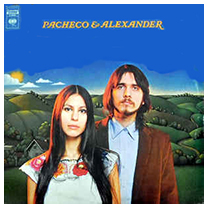 Tom Pacheco & Sharon Alexander "Pacheco & Alexander" (CBS Records, 1971) (LP)
Tom Pacheco & Sharon Alexander "Pacheco & Alexander" (CBS Records, 1971) (LP)
(Produced by John Hall & Tim Geelan)
A far-flung, kinda messy, folk-psych/boogie rock/'70s pop panoply, with songs in a variety of styles, generally characterized by an ecstatic party-rock vibe riddled with would-be lyrical profundities... Pacheco and Alexander had previously been in an East Coast psych-rock band called Euphoria which made one album then dissolved, after which they continued on as a duo... Most of the songs seem like starry-eyed hippiedelic ramblings, without much in the way readily discernible themes, although on one topical folk-type tune, "White Buffalo," Tom Pacheco bluntly hammers away on the theme of Native American rights. That track seems to be the strongest indicator of his future shift into a more overt country-rock persona... For the most part, this album seems to focus on Sharon Alexander as lead vocalist, and I gotta say, I find her kind of irritating, with a second-string Baez/Collins vibe that just doesn't work for me. It's like if Judy Collins dropped acid and drank tequila at a Laurel Canyon party and started free-associating her lyrics while dancing on a table top... I'm sure there are some folk-freak archivists out there for whom this sounds thrilling, I'm just not that into it. Lots of talented pickers on these sessions, though, including steel guitar by Bill Keith and producer John Hall, as well as bassist Jim Colgrove and drummer N. D. Smart, from Ian & Sylvia's Great Speckled Bird band.
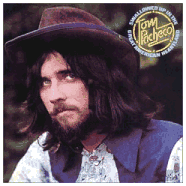 Tom Pacheco "Swallowed Up In The Great American Heartland" (RCA Victor, 1976) (LP)
Tom Pacheco "Swallowed Up In The Great American Heartland" (RCA Victor, 1976) (LP)
(Produced by Shadow Morton)
Huh, wow. What a weird record... I gotta admit, I don't totally get it. I mean, in reality this is probably a classic '70s cosmic-cowboy album, I just don't really like Pacheco's gruff, growly voice or his persona all that much. Still, jeez -- what a wealth of talent was assembled in the studio for this one! Steve Miller and James Burton on guitar, Red Rhodes playing pedal steel, Byrds alumnus Chris Etheridge, bluegrassers Byron Berline and Larry McNeely, and even Gail Davies singing harmony... It's one of those major label deals where they just throw everything they can at it... Even a pre-Letterman Paul Shaffer shows up to arrange one of the songs... and girl-group mogul Shadow Morton as producer? WTF? It's kind of overblown, and I just don't buy Pacheco's bohemian, cowboy-poet semi-spoof of Ramblin' Jack Elliot (or whatever it is he's doing) but in spite of it all, I guess this is worth checking out. There's some great picking (particularly the pedal steel riffs) and some of the songs resonate, although in kind of funny ways. I bought this because I spotted the song title "Until I Heard Willie Nelson," a country name-checking novelty song that turned out to me disappointing musically (too jittery) but does have some interesting lyrics about Pacheco's discovery of both country music and the '60s counterculture. You'll have to be your own judge, though... I might just be too grouchy to give the thumbs-up on this one.
 Tom Pacheco "The Outsider" (RCA Victor, 1976) (LP)
Tom Pacheco "The Outsider" (RCA Victor, 1976) (LP)
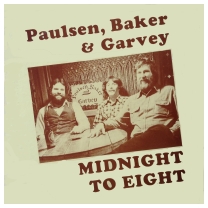 Paulsen, Baker & Garvey "Midnight To Eight" (Self-Released, 1978) (LP)
Paulsen, Baker & Garvey "Midnight To Eight" (Self-Released, 1978) (LP)
(Produced by Paulsen, Baker & Garvey and Todd Schaefer)
Hailing from Rochester, New York, the trio of John Paulsen, Keith Baker and John Garvey had a solid foundation in contemporary '70 soft-rock/country-rock/AOR, as heard on the opening tracks of this album, which echo the music of Harry Nilsson and John Denver... They drift backwards into jaunty, Chad Mitchell-ish '60s-style pop-folk (on the Paulsen-penned "Can't You Hear" and a version of "I'm Going Home," written by Fred Geis of the Kingston Trio) and sideways into a couple of country covers. I have to admit, their country numbers left me cold -- the vocals on "Glendale Train" and "Six Days On The Road" are a little too jokey and faux-hick for me, but this album is mostly notable for the wealth of original material, with half the songs written by John Paulsen, three by Baker, and several others that seem to have been written my fellow folkies in their orbit. The musicianship is pretty solid, and fans of John Denver-style folk-pop will find a lot to celebrate in these earnest, heartfelt recordings.
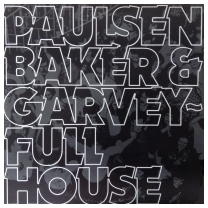 Paulsen, Baker & Garvey "Full House" (1981) (LP)
Paulsen, Baker & Garvey "Full House" (1981) (LP)
(Produced by Paulsen, Baker & Garvey; Rory Williams and David DiSabato, engineers)
This album was recorded live at the Elmwood Inn in Rochester, and the Crazy Horse bar in Honeoye, NY. There are several covers of outlaw standards, such as "Mamas, Don't Let Your Babies Grow Up To Be Cowboys," "Desperado," "Up Against The Wall, Redneck Mother," "Willin'" by Little Feat, and Pure Prairie League's "Pickin' To Beat The Devil." You could argue that there's a sarcastic undercurrent to their readings of the good ole boy ballads, but they still sound fun, and the audience seems to dig 'em. The trio also included a few of their own original songs, including "Girl, When I Met You" by Keith Baker and John Paulsen's "It's Alright." Once again, it's a folk scene vibe that predominates: sounding like the Kingston Trio at an after-hours party, the trio lead their audience in a hearty singalong medley of Leadbelly's "Irene" and Woody Guthrie's "Ramblin' Round," closing the album on a note that echoes their folkie roots, albeit with a boozy, post-hippie edge.
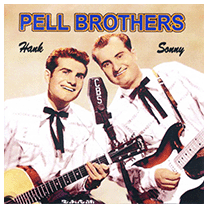 The Pell Brothers "The Brooklyn Hillbillies" (BACM-British Academy of Country Music, 2013) (CD)
The Pell Brothers "The Brooklyn Hillbillies" (BACM-British Academy of Country Music, 2013) (CD)
Not to be confused with The Pell Brothers bluegrass gospel group (below), these fellas, Hank and Sonny, were nicknamed "the Brooklyn Hillbillies," having been born as Anthony Pellegrino (b. 1936) and Michael Pellegrino (1929-1994) -- brothers, but not Pells. With help from yankee country star Smokey Warren, the duo broke into the late 'Fifties East Coast twang circuit, working mostly in New York and New Jersey, with a few jaunts up to Massachusetts and environs. They recorded a handful of singles between 1958-61, including many tracks with an Everly-esque pop-country feel. This disc collects some of those songs, but mostly is made up of home recordings that were previously unreleased. (One side note: some of the Pell Brothers lyrics were apparently penned by a then-teenaged Peter Grudzien, who was later lauded as a so-bad-it's-good "outsider" musician. Thanks also to Rocky's Rock 'N' Country Discography for some of this biographical info...)
The Plainfolk "Touch The Earth" (Major Recording Company, 1970) (LP)
(Produced by John Major)
Hailing from upstate New York, singers Tom and Joanne Yacovella worked together as a pop-folk duo for many years, including a couple of albums as The Plainfolk... This album includes country standards such as "Cowboy's Sweetheart" and "Green, Green Grass of Home" as well as more contemporary material like "Snowbird," Neil DIamond's "Sweet Caroline" and Kris Kristofferson's "Why Me." Backing musicians includes lead guitar Calvin Gochenour, steel player Ronnie Eyler, Roy Ingram on fiddle and Charlie Swank on piano.
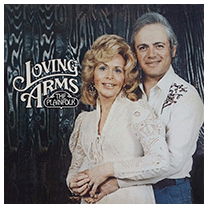 The Plainfolk "Loving Arms" (Pyramid Sound, 1980-?) (LP)
The Plainfolk "Loving Arms" (Pyramid Sound, 1980-?) (LP)
(Produced by Alex Perialis & Tony Volante)
Although the album art looks a little cheesy and rinky-dink, this is actually a pretty good record. The Yacovellas were both pretty good singers -- he, in the rumbly velvet baritone popular in the countrypolitan era and she with a clear, crystalline voice well suited to country-rock AOR covers such as Olivia Newton-John's "Let Me Be There," or her almost too-perfect replication of Linda Ronstadt's version of "Blue Bayou." Other covers include "Silver Wings," "Behind Closed Doors" and "Help Me Make It Through The Night." They aren't terribly original, but the performances are solid and easy on the ears -- indeed, the only track that's really iffy is their version of Roger Whittaker's "The Last Farewell," where the keyboards get just a little too tinkly for me. Otherwise, this ain't bad! There's no date on the album, so it's hard to know exactly when it came out -- Ronstadt's "Blue Bayou" was a hit in '77 and the matrix number on this LP is #8062N4, so I'm gonna float a guess that this is from 1980. Tom...? Joanne...? You out there? Can you confirm or deny?
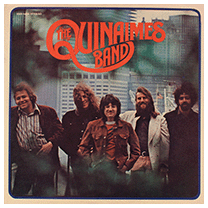 The Quinaimes Band "The Quinaimes Band" (Elektra Records, 1971)
The Quinaimes Band "The Quinaimes Band" (Elektra Records, 1971)
(Produced by Zachary & Jac Holzman)
A longhaired New York City rock group with rootsy leanings, The Quinaimes Band open this album with some truly groan-worthy white funk -- the opening track, a cover of David Bromberg's "Try Me One More Time," features an embarrassingly exaggerated faux Southern/black accent, with the singer insisting on over-enunciating the word "mo" over and over again. Yikes. But the group soon slides into mellower, rootsier material, including mildly lethargic versions of Utah Phillips' "Green Rolling Hills Of West Virginia" and Bob Dylan's "Visions Of Joanna," and while these tracks sound a bit stilted and precious, you still gotta give them points for being in the forefront of the '70s country-rock sound. The Quinaimes Band harbored veterans of various East Coast forerunners, notably Ken Pine, who played guitar for the Fugs, and several members of a short-lived New Jersey garage band called the Myddle Class, the best-known of whom was singer David Palmer, later known as the lead singer on the first Steely Dan album(!) Rounding out the ensemble was bassist and fiddler Jerry Burnham, who around the same time was also adding some twang to the equally crypto-rootsy Jake & The Family Jewels. Session players included newgrass fiddler Richard Greene, and pedal steel savant Bill Keith, who definitely bring some real twang-cred to the proceedings. The album is packed with originals by singers Danny Mansolino and David Palmer, who often sing as a duo, though fans of Palmer's work with Steely Dan may be gratified by songs like "Don't Take No" and their cover of Pop Staples "Don't Knock," where his vocals hit a more relaxed, familiar feel, despite the overall cluttered feel of this album. Alhough they might not have been really the most country-sounding hippie band ever, they had good taste in material, and took a fairly unusual approach for an East Coast band. Worth a spin... but don't set your expectations too high. [Footnote: in addition to helping launch Steely Dan, David Palmer later went on to collaborate with Carole King and, even more improbably, was in the late 'Seventies pop-rock band Wha-Koo.]
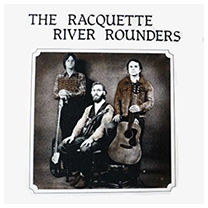 The Racquette River Rounders "The Racquette River Rounders" (Adirondack Records, 1980) (LP)
The Racquette River Rounders "The Racquette River Rounders" (Adirondack Records, 1980) (LP)
(Produced by David Fleur & The Racquette River Rounders)
Founded in 1979, the Racquette River Rounders was an acoustic string-swing and folk trio from Potsdam, New York, made up of Danny Gotham, Michael Hadfield and John Kribs... They took their name from the Raquette River, which originates in upstate New York, up in what folks call "the North Country." This album features lots of original material, including the "Harrisburg Rag," which was inspired by the 1979 Three Mile Island nuclear reactor meltdown. The group stayed together for a few years in the early 'Eighties, and according to Mr. Gotham's website, they occasionally played a few plugged-in electric gigs, using the name the Rolling Clones. Gotham later joined a bluegrass band called Summit, which recorded one album mid-decade, while Hadfield and Kribs formed a roots-rock band called Johnny & The Triumphs.
The Racquette River Rounders "Liberty" (Adirondack Records, 1982) (LP)
(Produced by David Fleur & The Racquette River Rounders)
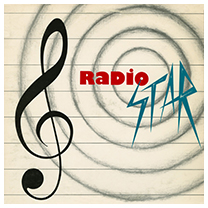 Radio Star "Radio Star" (Trackdown Studios, 1987) (LP)
Radio Star "Radio Star" (Trackdown Studios, 1987) (LP)
(Produced by Gorman John Ruggerio & Alan W. Prince)
The star of Radio Star, lead singer Gorman John Ruggerio, claimed fifteen years of experience acting on stage and in television prior to cutting this album at a studio in upstate New York... He has several family members backing him, as well as studio engineer Alan W. Prince on lead guitar, Randy Rollman on pedal steel and bass, Keith Crofut picking guitar on one tracks, and a few other folks. There are some country-themed tunes, such as "There's A Cowboy Town Where Nobody Knows" and "A Cowboy's Holiday," as well as some songs that seem to be from stage productions he was in... Years later Ruggerio landed some film roles, though largely he seems pretty obscure, at least on the country scene.
Ramblin' Lou & Joanie Marshall "Seashore Blues" (Arc Records, 1963-?) (LP)
Ramblin' Lou & Joanie Marshall's Family Band "...Featuring The Waltz Of New York" (Harmony Records, 1980-?) (LP)
(Produced by Paul David, Murray Hunt & Louis A. Schriver)
Wanna know where the folks from Hee-Haw got all their swell showbiz ideas? Well, it might not have been specifically from this family band from upstate New York, but certainly from countless country revue shows just like theirs. Don't believe me? How about Buck Owens, then? He wrote the liner notes praising these folks, and giving an outline of their decade's-long careers playing old-fashion country both onstage and on the radio. Ramblin' Lou Schriver (1929-2016) was a deejay on radio station WXRL in Lancaster, New York and presumably worked on the hillbilly vaudeville circuit as well, or in one of the many echoes of that scene. His wife Joanie was the daughter of another hillbilly performer, Bashful Eddie Marshall, who's joined her by his pal, comedian Armand ("Accordion Zeke") Cory... and check out Joanie Marshall pictured with her badass double-neck guitar, her name inlaid in pearl and everything! There are also several Schriver sprats playing various instruments, and a couple of ringers as well, notably Al Brisco on pedal steel. The songs are mostly covers of bandshell standards such as "Games People Play," "Green, Green Grass Of Home" and "Rocky Top," as well as a few backwoods oldies and gospel tunes -- the title track was written by Louis A. Schriver (not to be confused for his son Louis E. Schriver, who plays the drums). These folks were the real deal, an old-time family band with old-time country roots. Just ask Buck!
Ramblin' Lou (Schriever) "...And The Twin Pine Mountaineers" (BACM, 2019-?) (LP)
Many of Lou Schriver's early, vintage recordings are gathered on this collectors-only reissue, including hefty chunks of gospel and western material. It's also worth noting that Joanie Marshall also had some solo records of her own, notably on the Canadian-based label, Arc Records.
 Jim Ransom "Just Come Along For The Ride" (Biscuit City Records, 1974) (LP)
Jim Ransom "Just Come Along For The Ride" (Biscuit City Records, 1974) (LP)
Originally from New York state, folksinger Jim Ransom moved west in the 'Seventies and settled down in Denver, where he co-founded the Biscuit City label, which quickly became a focal point for the vibrant Colorado folk/acoustic/bluegrass scene. This was his first album, the prelude to a long career in low-key music making. (I have to confess, this looks too folkie for me to prioritize... But you never know. I might get around to it some day!)
 Jim Ransom "The Escape Of J. D. Mackenzie And Other Songs" (Biscuit City Records, 1976) (LP)
Jim Ransom "The Escape Of J. D. Mackenzie And Other Songs" (Biscuit City Records, 1976) (LP)
 Jim Ransom "Ransom Notes" (Biscuit City Records, 1977) (LP)
Jim Ransom "Ransom Notes" (Biscuit City Records, 1977) (LP)
The Raymond Avenue Ramblers "The Raymond Avenue Ramblers" (The Music Will Play, 1982) (LP)
(Produced by Tom Brooks, D. B. Brown & Debbie Macfarlan)
Formed in 1976, the Raymond Avenue Ramblers were a stylistically diverse, bluegrass-y string band made up of several professors, students and staffers at Vassar College in Poughkeepsie, New York (Raymond Avenue being the main road running along the western edge of the campus.) A longtime mainstay of the Hudson Valley roots music scene, the original band included Tom Brooks on bass, D. B. Brown (lead guitar), Debbie Macfarlan (guitar), Phil Seitz (mandolin) and David Yurkofsky on violin. Along with covers of folks like Albert E. Brumley and Hazel Dickens, this album includes one original written by Brown, and three by Macfarlan. With slowly shifting lineups and set lists, the group performed together for several decades, with onetime Dean of Students, D. B. Brown at the core. Around 2009, they changed their name to the Roundabout Ramblers, although I believe this was their only album released under either name. By the way, this will all be on the test.
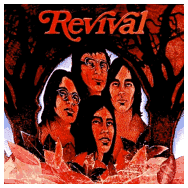 Revival "Revival" (Kama Sutra/Ampex Records, 1972) (LP)
Revival "Revival" (Kama Sutra/Ampex Records, 1972) (LP)
(Produced by Bob Rose)
An ambitious though awkward country-rock outing from a group with clear folkie roots. The liner notes detail how the core duo of singers Dan Daley and Michelle Conway played a bunch of "hoots" in the NYC folk scene, and later picked up a backing band that gave them more opportunity to branch out musically. They harmonize nicely, particularly when he takes the lead with his enthusiastic (and pleasantly dorky) vocals, hitting sort of a Gram Parsons-like vibe; when Conway sings lead, she inevitably leaps into a too-serious, Joan Baez-ian folkie warble, undercutting the country feel that Daley was building up. There's a spiritual-religious undercurrent to some of the songs, though many just seem like spaced-out, word-salad hippie-druggie stuff, which often takes on a quasi-religious tone, just because that's what sometimes happens when you realize you have hands and could fly the spaceship on your own. Musically, the rest of the band is kind of iffy -- the rhythm section is pretty stiff -- but there's some noteworthy pedal steel from Hank DeVito (later a key member of the Emmylou Harris band) and nice fiddling by Larry Packer, of the Cat Mother band. This album isn't really a classic, but it is a nice, authentic slice of early, hippiedelic country-folk. This was the first album featuring Dan Daley, who later struck gold as a songwriter, penning the Charlie Daniels Band hit, "Still In Saigon," a decade later.
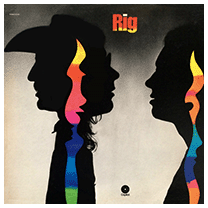 Rig "Rig" (Capitol Records, 1970) (LP)
Rig "Rig" (Capitol Records, 1970) (LP)
(Produced by Elliot Mazer & Adam Mitchell)
An amiable, but fairly inconsequential country-rock(ish) outing notable for Nashville heavyweight Kenny Buttrey playing drums, with his twangy colleague Weldon Myrick also sitting in on one track, though for the rest of the record it's Artie Richards who contributes on pedal steel. The driving force of this band came from the principal songwriters, Kendell Kardt and Don Kerr, who seem like your average early 'Seventies, middle-American semi-longhair dudes who got caught up in the cosmic vibes of the time. Kardt was the better-known of the two, a kid from Queens, New York whose career always skirted on the edges of success. Beginning in the 1960s, Kardt was in a series of bands and projects that fell apart just when a major label deal looked likely... This album turned out to be his magnum opus; a couple of solo projects followed, but both were shelved by the labels involved. He moved into the 'Seventies folk scene, but doesn't seem to have recorded much beyond this hippie-era album. As a legacy, this record ain't bad -- the songs are rambling and inchoate, expressive but unformed, but they also have a quavering, fragile sincerity that probably has more appeal for the folk-freak crowd than for us twangsters. I suppose it wasn't implausible that these guys could have succeeded, given the eclectic artistic environs of the era, though as fate would have it, Rig was destined to be one of those weird, obscure artifacts of a very inventive era.
 The Roadrunners "An Evening With The Roadrunners" (Coyote Records, 1973) (LP)
The Roadrunners "An Evening With The Roadrunners" (Coyote Records, 1973) (LP)
(Produced by Al Gibson, Bob Grotke & Vince Morette)
"Recorded LIVE! Island Lanes" this album was a memento of a bowling alley/bar in Grand Island, New York -- up around Buffalo -- that was owned by a guy named Norm Mondry, who plays bass in this band. I don't think the Roadrunners were much of an actual band, as there's little trace left of them online, though they probably were the house band for a while. The quartet included Bobby Chavers on rhythm guitar, Tiny Ted Froman (drums), Norm Mondry (bass) and a fellas mysteriously identified as "Jimmy G" on lead guitar. The repertoire was all country covers, with "Proud Mary" perhaps the most contemporary hit, along with chestnuts like "White Lightning" and "Ghost Riders In The Sky," some boozing ballads and a couple of Marty Robbins tunes. The recording quality is lamentably lo-fi, though in a sense that contributes to its authenticity... In addition, many of the performances seem pretty low-key, though when drummer Froman takes the mic to sing lead, he taps into a pretty robust Buck Owens-y vibe, and also cuts loose on the drums, adding a little extra bounce to their sound. I think Norm Mondry owned Island Lanes until around 1980, when it changed hands to the present owners, though he held plenty of events throughout the rest of the 'Seventies, such as a "CB radio jamboree" thrown in '77. As far as I know this was the only record any of these guys made.
Michael Roden "Born In A Whirl" (1978) (LP)
Country-rock/soft pop from upstate New York... Roden's Stony Creek Band featured Randy Rollman on pedal steel, but also included instruments such as the maracas, congas, clave, clarinet, etc., so maybe it's not totally "country"?
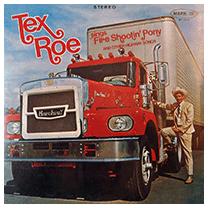 Tex Roe "Sings Fire Shootin' Pony And Other Highway Songs" (Mark IV Records, 1970-?) (LP)
Tex Roe "Sings Fire Shootin' Pony And Other Highway Songs" (Mark IV Records, 1970-?) (LP)
(Produced by Link Wray)
A set of trucker tunes from New York state honkytonker Tex Roe -- aka John Frederick Robarge, (1922-2001) -- whose career stretched back to the 1940s... Based around Syracuse, Roe hosted radio and TV programs, was a cast member of the WWVA Jamboree, and appeared on numerous shows such as the Ernest Tubb show as well as on WSM, the home of the Grand Ole Opry. Over the years, he recorded a handful of songs that charted nationally, including numerous 78s and 45s, although this was his only full album.
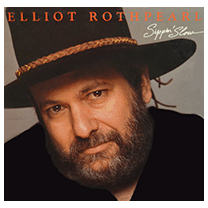 Elliot Rothpearl "Sippin' Slow" (Rumplestiltskin Records, 1988) (LP)
Elliot Rothpearl "Sippin' Slow" (Rumplestiltskin Records, 1988) (LP)
(Produced by Elliot Rothpearl & Ed Sloan)
Dunno much about this guy... He seems to have been from upstate New York and wrote most of the songs on here. Lots of pros on here backing him, including Lloyd Green playing pedal steel and Buddy Spicher on fiddle, while Rothpearl plays guitar, banjo and mandolin... Also notable is Chip Taylor chiming in with some background vocals... The arrangements are good, though in all honesty, Rothpearl's vocals don't always hold up well.
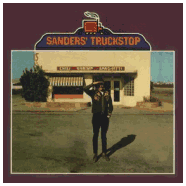 Ed Sanders "Sanders' Truckstop" (Warner Brothers, 1970) (LP)
Ed Sanders "Sanders' Truckstop" (Warner Brothers, 1970) (LP)
The first solo album by East Coast poet-activist Ed Sanders, co-founder of the confrontational avant-garde yippie folk group The Fugs. After they disbanded, Sanders continued his satire of American culture with a pair of country-tinged albums that reflected the divide between "straights" and weirdos like hippies and queers. Perhaps the best-known song is the blithe yet belabored recitation song, "Jimmy Joe, The Hippybilly Boy," surrounded by tunes like "The Iliad" (about rednecks beating up gays) along with myriad hippie-druggie references. The broad, blunt humor and caustic lampooning of small-town prejudice may seem a bit over-the-top now, but in Sanders' defense, folks nowadays might not realize that there was a lot of truth to the pictures he painted: rebels and longhairs really did get their asses kicked by rednecks and frat boys in the '60s and '70s, and this albums reflects the tensions of the time, albeit in a strident, assertive style. Like the old Fugs records, it's not exactly the kind record you'd put on for relaxation, or really need to hear more than once, but it is an significant roadmark in early '70s alt-country, even if Sanders didn't take the "country" part of it seriously, other than as a target for parody. (He did have real roots in the New York folkie-bohemian scene, with ties to the Holy Modal Rounders and other avant-folk musicians, many of whom play on here, but that crowd definitely saw Nashville as playing for the other team...) Anyway, this is a semi-funny, rather acerbic album, worth checking out for its political content, though I doubt you'll cherish it forever and ever.
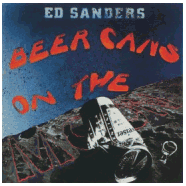 Ed Sanders "Beer Cans On The Moon" (Warner Brothers, 1973) (LP)
Ed Sanders "Beer Cans On The Moon" (Warner Brothers, 1973) (LP)
Sanders (and everybody else in America) got weirder and weirder as the '70s went along, and 1973 was a peak year for weirdness and general tension in the culture. This more rock-oriented album still has its country touchstones, like "Yodeling Robot," a song about an automaton that falls in love with Dolly Parton, but it also has many more pointed political references, in songs such as "Nonviolent Direct Action" and "Henry Kissinger," which reflect the simmering frustrations of the Watergate era, when "the system" really seemed to have collapsed, but not in a particularly good way. Less fun and way more grind-y than Truckstop, but also groovy in its own bizarre, historical way. If you're looking for hard-left anarcho-hippie country music, this is about as extreme as it gets. But it is pretty blunt, and it sure ain't easy listening.
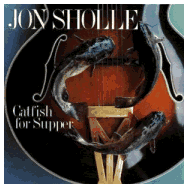 Jon Sholle "Catfish For Supper" (Rounder Records, 1978) (LP)
Jon Sholle "Catfish For Supper" (Rounder Records, 1978) (LP)
(Produced by Jon Sholle)
A relaxed, cheerful, eclectic set, mixing Tin Pan Alley-flavored swing-jazz, bluegrass twang and a smidge of acoustic blues... A perfect record to represent the musical diversity and talent of the times. New York native Jon Sholle (1948-2018) was a guitarist who had gigged with a bunch of jazz, pop and Broadway performers before stepping out as a solo artist. Here he picks up where Dan Hicks left off, kicking back with some of the hottest pickers of the '70s acoustic twang scene: if you ever wanted to hear David Bromberg jamming with David Grisman, here's your chance. Also on board are other members of the Grisman/Rounder Records newgrass scene, such as Darol Anger, Rob Wasserman, Tony Rice and Tony Trischka, et. al., although this isn't a standard-issue newgrass record, not by a longshot. Nice chance to hear those guys playing in different styles, such as folk-blues and oldies jazz. The title track, "Catfish For Supper," was a novelty number frequently played on KFAT radio, but the rest of the record is packed with gems as well -- Bela Fleck's fans will want to check out his sweet, slick picking on the instrumental, "Triangle," while Bromberg gets in some nice licks on tracks such as the Jimmie Rodgers-styled "Railroad Blues." Nice stuff... Still a winner after all these years!
Jon Sholle "Out Of The Frying Pan" (Rounder, 1997) (CD)
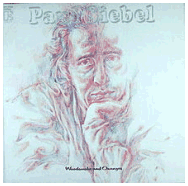 Paul Siebel "Woodsmoke And Oranges" (Elektra Records, 1970) (LP)
Paul Siebel "Woodsmoke And Oranges" (Elektra Records, 1970) (LP)
(Produced by Peter K. Siegel)
East Coast/Greenwich Village folkie Paul Siebel set a high bar -- both for himself and for the nascent singer-songwriter genre -- with this emotionally rich, soulful, near-perfect album. He's probably best remembered as the author of the faded-prostitute ballad, "Louise," which was popularized by Bonnie Raitt and other artists -- here's Siebel's own original version, which is equally resonant, though there's a different tone having a man sing it as opposed to a woman. I used to like "Louise," but now I'm over it, perhaps because a couple of decades of HBO and other modern culture have exhausted the whore-with-a-heart-of-gold topic. The rest of this album holds perhaps more durable material -- there's his catchy, bluesy "Any Day Woman" (which Raitt also covered) as well as "She Made Me Lose My Blues" and other contemplative folkie gems. For me, the best songs on here are two tunes that feel connected, "Bride, 1945," and "Then Came the Children," which reflect on middle-age and the experience of middle-class families in the post-WWII era, topics that are handled in a surprisingly mature, insightful way, considering the extremely polarized politics of the hippie-era "generation gap." Siebel separated himself from the pack of late '60s/early '70s both in the emotional maturity of his lyrics and the calm, precision and high quality of his songwriting. It helps that among the musicians backing him here are guitarist David Bromberg, fiddler Richard Greene and pedal steel whiz Weldon Myrick, three of the best players of the era. A fine album that remains one of the classic folk albums of the era.
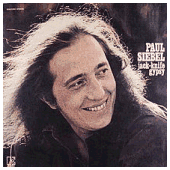 Paul Siebel "Jack-Knife Gypsy" (Elektra Records, 1971) (LP)
Paul Siebel "Jack-Knife Gypsy" (Elektra Records, 1971) (LP)
(Produced by Robert W. Zachary)
Another solid set, though it was hard to top his debut. This is a noteworthy album, but it seems more workmanlike and less vital than Woodsmoke, with fewer songs that stand out as boldly. Largely that's because of the production style, which drifts into lavish pop-folk arrangements and a "big" sound that stands at odds with Siebel's natural, plainspoken vocal style. A bunch of great musicians on here, including bluegrassers like Clarence White and David Grisman, old-school Nashville session men such as Buddy Emmons, cajun fiddler Doug Kershaw, and younger guys like Bernie Leadon and Russ Kunkel, who would be at the heart of the Southern California country-rock scene. But for Siebel, this was his swan-song for the decade, as depression and self-doubt sidelined his music career. Sadly, I would have to say that this album just sounds like they were trying too hard -- it feels crowded and busy, and too self-consciously crafted. Still, it's certainly worth checking out, particularly if you've been caught in the spell of his first record.
Paul Siebel "Live At McCabes" (Rag Baby Records, 1981) (LP)
After several years in self-imposed retirement, Siebel came back in 1978 to give an intimate concert at one of Southern California's premiere folk clubs. Backing him are David Bromberg and bassist Gary White, who both performed on Siebel's first album.
Paul Siebel "Paul Siebel" (Rounder-Philo, 2004)
This generously-programmed CD reissue includes both of Siebel's Elektra albums, Woodsmoke And Oranges, and Jack Knife Gypsy, and helped bring Siebel's work back into the popular eye. A great bargain!
Paul Siebel "Woodsmoke And Oranges/Jack Knife Gypsy" (WEA-UK, 2004)
This import basically covers the same territory as the CD above... Siebel's two classic albums, digitally available in a single-disc collection, but released for a European audience.
Ronnie Smith "New York's Country Ronnie Smith" (UMC Records, 197-?) (LP)
Ronnie Smith "...Sings Pretty Country" (Transworld Records, 1979-?) (LP)
(Produced by Kermit Goell)
A set of mostly original material by a singer from Herkimer, New York... Mr. Smith went to Nashville to record this set, with steel guitarist Sonny Garrish leading the sessions and Tommy Williams on fiddle (with the other players listed simply as "all the Nashville Musicians...") All but two of the songs are credited or co-credited to songwriter/archeologist Kermit Goell (1915-1997). Not totally sure what the connection was; I would not be surprised if "Ronnie Smith" was Goell's nom-de-twang, though maybe they were just good friends. Also not sure if this was the same Ronnie Smith who worked with Tommy Allsup in the late '60s: anyone out there know more?
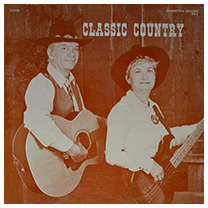 The Smiths "Classic Country" (Homestead Records, 19--?) (LP)
The Smiths "Classic Country" (Homestead Records, 19--?) (LP)
(Produced by Dana Green)
Adorable cover photo with the middle-aged/elderly duo of William A. Smith (guitar and vocals) and his wife, Rhea Jane Smith (bass). According to the liner notes they were originally from Syracuse, New York but moved out west to California in the late 1950s. Back East, he had been a regionally popular performer who had his own radio and TV shows when he was still in his teens; it's not clear when he let go of his musical career, but the liner notes tell us he got back into music after suffering a debilitating heart attack in 1976, and Mrs. Smith took up bass playing and songwriting as part of his recovery. Although the album title implies a set of country oldies, most of the songs are actually their own original compositions, augmented by covers of "Crazy," "I Fall To Pieces" and a couple of real chestnuts -- the ancient Vernon Dalhart classic, "The Prisoner's Song" and a lesser-know Carter Family tune. Good luck tracking down info on the early years of a guy named Bill Smith (I tried!) but they were for sure living in the Los Angeles suburb of Montclair at the time they cut this album, and presumably working with some local artists for these sessions.
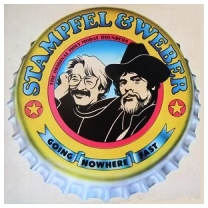 Stampfel & Weber "Going Nowhere Fast" (Rounder Records, 1981) (LP)
Stampfel & Weber "Going Nowhere Fast" (Rounder Records, 1981) (LP)
(Produced by Dan Doyle & John Swenson)
More nutty stuff from Peter Stampfel and Steve Weber of Unholy Modal Rounders infamy... They reprise a bunch of wonderful songs from the days of yore -- vaudeville, Appalachian and Tim Pan Alley oldies, novelty songs and sweet, sincere ballads given a disjointed, squeaky fiddle-and-careless guitar makeover. True to form, Stampfel & Weber play their music in a seemingly haphazard manner, playing "sloppy" just because they can, their actual mastery of the material is so complete that they can relax and enjoy themselves and know their audience will still be along for the ride. Interspersed with the kooked-up renditions of older tunes are some legitimately weirder originals, such as "Jeannie's Dream," a rambling recitation about a woman who finds some old records in her attic and has the cops called on her when she plays them too loud. If you're already tapped into the whole Rounders/Clamtones vibe, you're sure to enjoy this record as well.
Patti Stanford "Introducing Patti Stanford -- Singing The Final Call" (Little Giant Records, 1977) (LP)
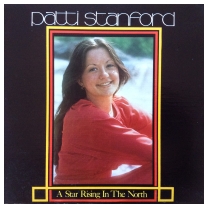 Patti Stanford "A Star Rising In The North" (Canasee Records, 197-?) (LP)
Patti Stanford "A Star Rising In The North" (Canasee Records, 197-?) (LP)
(Produced by Bob Wood)
A solid set from upstate New York's Patti Stanford, who sings in a light, clear countrypolitan style worthy of comparison to '70s gals such as Donna Fargo and Lynn Anderson. The album slips from straight-up country-pop into more AOR-oriented soft rock, with maybe a little hint of Karen Carpenter in the mix. Stanford headed to Tennessee to cut this album, with backing by a number of Nashville's finest -- D. J. Fontana, Greg Galbraith, Doug Jernigan, and Bunky Keels, along with the Cates Sisters singing backup. Nothing earthshaking or innovative, but certainly a better-than-average indie album, with smooth, confident vocals and a professional accompaniment throughout. If you like off-the-radar countrypolitan, you might want to track this disc down.
 Star Spangled Washboard Band "A Collector's Item" (Flying Fish Records, 1977) (LP)
Star Spangled Washboard Band "A Collector's Item" (Flying Fish Records, 1977) (LP)
A wacky, bluegrassy stringband originally from around Albany, New York... These guys got together in 1971 and carved out a niche in 'Seventies East Coast folk scene, starting with a gig at the Gaslight Village amusement park in nearby Lake George, and moving their way through various festivals and clubs. The group remained together until 1978, disbanding not long after this album came out; several core members regrouped into the satirical rock band Blotto, which had an early hit on MTV with their novelty number, "I Wanna Be A Lifeguard."
 Dean Steiding "Take Me Back" (Eagle Records, 1983) (LP)
Dean Steiding "Take Me Back" (Eagle Records, 1983) (LP)
(Produced by Guthrie Thomas & Dean Steiding)
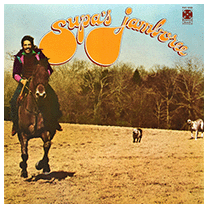 Supa "Supa's Jamboree" (Paramount Records, 1971) (LP)
Supa "Supa's Jamboree" (Paramount Records, 1971) (LP)
(Produced by Buddy Buie)
Richard Supa (ne Richard Goodman) grew up in Brooklyn, New York and joined a series of rock bands, including the Rich Kids and one called Man, before going solo in the early 'Seventies. His first couple of albums had a country-rock/southern rock flair, particularly this one, where he was backed by a band called Jamboree (which, according to the liner notes, had "some very together musicians," in the parlance of the time...) As the decade wore on, Supa veered into more of a hard-rock mode, and is perhaps best remembered for his raunchy anthem, "Chip Away The Stone," which was covered by both Aerosmith and Humble Pie. I guess this is "country" in roughly the same measure as songs like "Honky Tonk Woman" by the Rolling Stones, indicative of the ambient vibe of the time, more than a deep commitment to country music itself. Questions of twangitude aside, it must be said that Supa had a pretty unusual singing voice; an acquired taste, for sure.
Supa "Homespun" (Paramount Records, 1972) (LP)
(Produced by Buddy Buie)
Chip Taylor - see artist discography
Artie Traum -- see artist profile
Happy Traum -- see artist profile
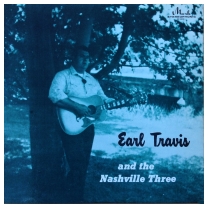 Earl Travis & The Nashville Three "Earl Travis & The Nashville Three" (Mark Records, 197--?) (LP)
Earl Travis & The Nashville Three "Earl Travis & The Nashville Three" (Mark Records, 197--?) (LP)
(Produced by Al Gibson)
A country lounge band who played at the Darien Lake Fun Country theme park in upstate New York, and at the nearby Green Acres restaurant. Surprisingly for a park band, they had a real wealth of original material: on this album they cover Larry Croce's "Bad Bad Leroy Brown" and a Billy Mize song, but otherwise, these songs were all written by Earl Travis.
Eric Weissberg - see artist discography
 Chuck Wilson "Country Songs And Dreams" (Killer Records, 1983) (LP)
Chuck Wilson "Country Songs And Dreams" (Killer Records, 1983) (LP)
(Produced by Mickey Barnett & Reid Northrup)
An ambitious though obscure set of all-original material from a bar-band crooner out of Albany, New York... Local country deejay Reid Northrup hauled songwriter Chuck Wilson into a studio run by Mickey Barnett, originally just with the intention to demo Wilson's original material, but along the way they decided to put out an album. That back story might explain why some of these tracks don't really land that well -- the difference between playing to make a record and playing to get your ideas down can be pretty big, and the band often has a lackadaisical, low-energy feel, though they get more engaged as things move along. Likewise, Wilson's vocals can feel inconsistent from track to track -- I had to struggle past some of the slower ballads before I was able to appreciate his strengths, but if you skip the weaker tracks, this album definitely has some good stuff to offer. I'm not sure if the backing musicians were from his own backing band, Dallas, or if they were guys who worked for Mickey Barnett... the credits list Chuck Wilson on vocals and guitar, Bob Chiarella (steel guitar), Joe Donovan (drums), Drew Francis (piano, and -- yikes -- flute), and John Mancino (bass), with strings by Karen Houghuis, arranged by Drew Francis.
 Al 'Porky' Witherow "Are You Satisfied?" (Cerylaine Records, 197--?) (LP)
Al 'Porky' Witherow "Are You Satisfied?" (Cerylaine Records, 197--?) (LP)
(Produced by Al Curven)
Born in York, Pennsylvania, Alfred "Porky" Witherow (1935-2004) was a child musical prodigy in the 1940s, and while in his teens he toured with Bob Hope's USO show during the Korean War. Settling down in Vails Gate, New York, he cut a few singles and recorded some self-released albums but seems to have retired from music sometime in the 1970s, eventually moving to Florida, where he passed away in 2004. As far as I know, this was his first full album, recorded while Witherow was a regular on the WWVA "Jamboree" show.
 Al 'Porky' Witherow "Singing Everybody's Favorites" (Arctic Records, 1974) (LP)
Al 'Porky' Witherow "Singing Everybody's Favorites" (Arctic Records, 1974) (LP)
(Produced by Al Witherow)
Al 'Porky' Witherow & Birdie Lee "Duo Dynamite" (Arctic Records, 1974) (LP)
(Produced by Loryn Atwell)
Originally from West Virginia, "Miss Birdie Lee" was living in upstate New York when she joined singer Al Witherow's group, the Country Mystery, learning to play bass in order to fill an open slot in the band. On this album they mostly sang duets in a kind of old-school style reminiscent of country duos like Carl Butler & Pearl or the Mosbys, and less like the slicker-sounding stars of the day, such as Conway and Loretta. The band included Lee's husband Dallas Eugene on drums, bassist Roger Ray, fiddler June Eikard ("Canada's Lady Of The Fiddle"!), pianist Wayne Sexton, Dee Woodmore on lead guitar and Buddy Gregory playing pedal steel. The musical backing is also a little rough around the edges, in a way that I find appealing -- there was genuine twang in here, as well as a degree of amateurism that's kind of appealing, particularly given the direction country was headed in at the time... Definitely worth a spin!
 Dale Youngs & The Country Rebels "Walking Down An Old Country Road" (Round Robin, 1978) (LP)
Dale Youngs & The Country Rebels "Walking Down An Old Country Road" (Round Robin, 1978) (LP)
(Produced by Roy Drusky & Jim Pierce)
Dale Youngs was an East Coast, rust-belt country singer, born in New York state with roots in Pennsylvania, who made his way to Nashville where he landed a gig in Roy Drusky's band, circa 1975-78. He played on the Opry and recorded this album with Drusky's help around the same time. Drusky may have helped with the repertoire as well, notably showcasing a trio of previously-recorded Eddie Rabbit songs -- "Pure Love" (a hit for Ronnie Milsap in '74), "Do You Right Tonight" and "Hearts On Fire" (a #2 hit for Rabbit in '77) -- a nod to Rabbit's early years as a Nashville songwriter, when Drusky was one of the first artists to record his work. Curiously, Youngs also does a gender-flipped version of a classic western novelty oldie, sung here as "I Want To Be A Cowgirl's Sweetheart, along with covers such as Ray Price's "Burning Memories" and Marty Robbins' "You Gave Me A Mountain." I don't know the details, but Youngs died at age 32 (1951-1984) and as far as I know, this was his only album.
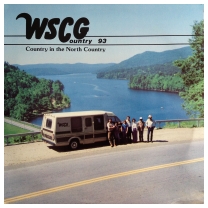 Various Artists "WSCG COUNTRY IN THE NORTH COUNTRY" (MCE Recordings, 1985) (LP)
Various Artists "WSCG COUNTRY IN THE NORTH COUNTRY" (MCE Recordings, 1985) (LP)
WSCG 93.5-FM was a small local station broadcasting at a mere 1250 watts from Corinth, New York, a tiny hamlet north of Saratoga Springs that proudly labels itself as "the snowshoe capital of the world." The station signed on in 1981, and operated throughout the decade, finally folding up and selling the license in 1991. Along the way, they seem to have fostered a lot of local talent, as heard on this album which spotlights bands such as Aged In The Hills, Blackwater, Ray Blackwater, Jeff Durkee, the Handpicked Band, Ron Roberts, Stampede and Marty Wendell. No info about the where or whyfore of the album itself, other than a brief blurb by the station's program director, Stan Edwards. Anyone out there have more info about this one?
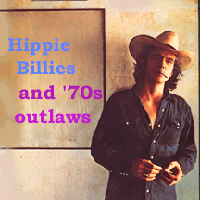 Locals Only: New York Twang This page collects artist profiles and record reviews of country music from the state of New York. It's part of a larger guide to unsigned and off-the-radar regional artists from years gone by, which is also part of the even larger Guide To Hick Music on Slipcue.com. Most of the artists here are little-known locals, bar-band singers, etc., but the list also includes Nashville stars who were from the state, as well as some bluegrass and gospel artists, etc. This is an ongoing projects, with new stuff coming in all the time, and we welcome any recommendations, additions or corrections.
Locals Only: New York Twang This page collects artist profiles and record reviews of country music from the state of New York. It's part of a larger guide to unsigned and off-the-radar regional artists from years gone by, which is also part of the even larger Guide To Hick Music on Slipcue.com. Most of the artists here are little-known locals, bar-band singers, etc., but the list also includes Nashville stars who were from the state, as well as some bluegrass and gospel artists, etc. This is an ongoing projects, with new stuff coming in all the time, and we welcome any recommendations, additions or corrections.
 Tom Akstens "Original And Traditional Music" (Takoma Records, 1976) (LP)
Tom Akstens "Original And Traditional Music" (Takoma Records, 1976) (LP)
 David Allan "Town And Country" (Scooter Records, 1968) (LP)
David Allan "Town And Country" (Scooter Records, 1968) (LP)
 Mike Asquino "Old Friends And Fine Wine" (Red Cloud Records, 1980) (LP)
Mike Asquino "Old Friends And Fine Wine" (Red Cloud Records, 1980) (LP)
 Salty Austin "Full Course Country" (Seneca Records, 1976) (LP)
Salty Austin "Full Course Country" (Seneca Records, 1976) (LP)
 Gus Backus "Hillbilly Gasthaus" (Polydor, 1964) (LP)
Gus Backus "Hillbilly Gasthaus" (Polydor, 1964) (LP)
 Al Bain & Kathy Bain "Together In All Kinds of Country" (Trackdown Records, 19--?) (LP)
Al Bain & Kathy Bain "Together In All Kinds of Country" (Trackdown Records, 19--?) (LP)
 Bill Banden "Banjo Unique" (Duncan Records, 1979) (LP)
Bill Banden "Banjo Unique" (Duncan Records, 1979) (LP)
 Huck Baxter "Six Days On The Road" (K-Ark Records, 197-?) (LP)
Huck Baxter "Six Days On The Road" (K-Ark Records, 197-?) (LP)
 Bill Billington "All In Life's Game" (Nu-Sound Records, 1980) (LP)
Bill Billington "All In Life's Game" (Nu-Sound Records, 1980) (LP)
 Tommy Blue "Nature Of A Man" (TWC Records, 1977) (LP)
Tommy Blue "Nature Of A Man" (TWC Records, 1977) (LP)
 Jonny & Sue Bondz "...Sing Original Country" (Bondz Records, 1975-?) (LP)
Jonny & Sue Bondz "...Sing Original Country" (Bondz Records, 1975-?) (LP)
 Borderline "Sweet Dreams And Quiet Desires" (United Artist/Avalanche, 1972) (LP)
Borderline "Sweet Dreams And Quiet Desires" (United Artist/Avalanche, 1972) (LP)
 Bottle Hill "A Rumor In Their Own Time" (Biograph Records, 1972) (LP)
Bottle Hill "A Rumor In Their Own Time" (Biograph Records, 1972) (LP)
 Buffalo & Brandy "I Love You" (KM Records, 1981) (LP)
Buffalo & Brandy "I Love You" (KM Records, 1981) (LP)
 Bumpy & Sawmill Run "Solid Silver" (Marjon International Records, 1977) (LP)
Bumpy & Sawmill Run "Solid Silver" (Marjon International Records, 1977) (LP)
 Randy Burns "I'm A Lover, Not A Fool" (Polydor Records, 1972) (LP)
Randy Burns "I'm A Lover, Not A Fool" (Polydor Records, 1972) (LP)
 Randy Burns "Still On Our Feet" (Polydor Records, 1973) (LP)
Randy Burns "Still On Our Feet" (Polydor Records, 1973) (LP)
 Alice Clemens "Fiddlin' Fun" (Osceola Records, 19--?) (LP)
Alice Clemens "Fiddlin' Fun" (Osceola Records, 19--?) (LP)
 Wanda Conklin "Hush" (Norm Records, 1969) (LP)
Wanda Conklin "Hush" (Norm Records, 1969) (LP)
 The Doug Cook Band "Late Nights And Bar Fights" (Rocking Horse Records, 1977) (LP)
The Doug Cook Band "Late Nights And Bar Fights" (Rocking Horse Records, 1977) (LP)
 Cooker " 'Bout Time" (Scepter Records, 1974) (LP)
Cooker " 'Bout Time" (Scepter Records, 1974) (LP)
 Cortland Country "The Cortland Country Music Album" (Cortland Records, 1977) (LP)
Cortland Country "The Cortland Country Music Album" (Cortland Records, 1977) (LP)
 Cranberry Lake "Old-Time And Jugband Music" (Swallowtail Records, 1977) (LP)
Cranberry Lake "Old-Time And Jugband Music" (Swallowtail Records, 1977) (LP)
 The Dady Brothers "Mind To Move" (Emanon Records, 1979) (LP)
The Dady Brothers "Mind To Move" (Emanon Records, 1979) (LP)
 Dark Town Poker Club "Fairwell" (Jeree Records, 1976-?) (LP)
Dark Town Poker Club "Fairwell" (Jeree Records, 1976-?) (LP)
 Hank Davis "Crazy Living" (Relaxed Rabbit Records, 1984) (LP)
Hank Davis "Crazy Living" (Relaxed Rabbit Records, 1984) (LP)
 The Dean Brothers "As They Are" (Pilgrim Records, 1976) (LP)
The Dean Brothers "As They Are" (Pilgrim Records, 1976) (LP)
 Desperado "Desperado" (Calfdisk Records, 1978) (LP)
Desperado "Desperado" (Calfdisk Records, 1978) (LP)
 Desperado "Out On A Limb" (PCI Records, 1982) (LP)
Desperado "Out On A Limb" (PCI Records, 1982) (LP)
 The Don & Tony Show "The Don And Tony Show" (QCA/Capitol Star Artist Records, 1970-?) (LP)
The Don & Tony Show "The Don And Tony Show" (QCA/Capitol Star Artist Records, 1970-?) (LP)
 Barry Drake "Happy Landing" (Capitol Records, 1971) (LP)
Barry Drake "Happy Landing" (Capitol Records, 1971) (LP)
 Barry Drake "Roadsongs" (Catskill Mountain Records, 1977) (LP)
Barry Drake "Roadsongs" (Catskill Mountain Records, 1977) (LP)
 Barry Drake "Solo Survivor" (Catskill Mountain Records, 1982) (LP)
Barry Drake "Solo Survivor" (Catskill Mountain Records, 1982) (LP)
 Tom Edington "Sings Cowboy Gold" (MarJon Records, 1978) (LP)
Tom Edington "Sings Cowboy Gold" (MarJon Records, 1978) (LP)
 Tom Everett "Porchlight On In Oregon" (RCA Victor, 1971) (LP)
Tom Everett "Porchlight On In Oregon" (RCA Victor, 1971) (LP)
 Troy Ferguson & Sue Smith "O'Lunney's Presents..." (O'Lunney's Country Music City, 1975-?) (LP)
Troy Ferguson & Sue Smith "O'Lunney's Presents..." (O'Lunney's Country Music City, 1975-?) (LP)
 Larry Finnegan "My Kind Of Country" (Svensk American, 1966) (LP)
Larry Finnegan "My Kind Of Country" (Svensk American, 1966) (LP)
 Larry Finnegan "In Memoriam" (Sonet Records, 1979) (LP)
Larry Finnegan "In Memoriam" (Sonet Records, 1979) (LP)
 Fireball Express "Fireball Express" (Casino Records, 197--?) (LP)
Fireball Express "Fireball Express" (Casino Records, 197--?) (LP)
 Bob Flower "...And His Star Dusters" (Do-Re-Me, 1966) (LP)
Bob Flower "...And His Star Dusters" (Do-Re-Me, 1966) (LP)
 Free Beer "Free Beer" (Southwind Records, 1975) (LP)
Free Beer "Free Beer" (Southwind Records, 1975) (LP)
 Free Beer "Highway Robbery" (RCA, 1976)
Free Beer "Highway Robbery" (RCA, 1976)
 Austin Gravelding "Self Made Man" (GWP Records, 1970) (LP)
Austin Gravelding "Self Made Man" (GWP Records, 1970) (LP)
 Austin Gravelding "Restless Winds" (GWP Records, 1971) (LP)
Austin Gravelding "Restless Winds" (GWP Records, 1971) (LP)
 Duane Gray "Call This Day Gray" (EJ Records, 1986) (LP)
Duane Gray "Call This Day Gray" (EJ Records, 1986) (LP)
 Great Speckled Bird "Great Speckled Bird" (Bearsville Records, 1970) (LP)
Great Speckled Bird "Great Speckled Bird" (Bearsville Records, 1970) (LP)
 Smokey Greene "...With Jimmy Hamblin, Al Bain, Gary Blodget" (Green Mountain Records, 1967-?) (LP)
Smokey Greene "...With Jimmy Hamblin, Al Bain, Gary Blodget" (Green Mountain Records, 1967-?) (LP)
 Arlo Guthrie "The Best Of Arlo Guthrie" (Warner Brothers, 1977) (LP)
Arlo Guthrie "The Best Of Arlo Guthrie" (Warner Brothers, 1977) (LP)
 Arlo Guthrie "Alice's Restaurant" (Reprise Records, 1967)
Arlo Guthrie "Alice's Restaurant" (Reprise Records, 1967)
 Neil Harbus "Harbus" (Evolution Records/Stereo Dimension, 1973)
Neil Harbus "Harbus" (Evolution Records/Stereo Dimension, 1973)
 Ed Henry "Country And Eastern" (Epic Records, 1967) (LP)
Ed Henry "Country And Eastern" (Epic Records, 1967) (LP)
 Jake Holmes "So Close, So Very Far To Go" (Polydor Records, 1970) (LP)
Jake Holmes "So Close, So Very Far To Go" (Polydor Records, 1970) (LP)
 Billy Lee Huggins & Holly "Billy Lee Huggins And Holly" (Artist House Records, 1985-?) (LP)
Billy Lee Huggins & Holly "Billy Lee Huggins And Holly" (Artist House Records, 1985-?) (LP)
 Hungry Chuck "Hungry Chuck" (Bearsville Records, 1971) (LP)
Hungry Chuck "Hungry Chuck" (Bearsville Records, 1971) (LP)
 Jumbo String Band "Testigos De Jumbo" (Dreamland Studio, 1980) (LP)
Jumbo String Band "Testigos De Jumbo" (Dreamland Studio, 1980) (LP)
 Jimmy Kaye "Gentle To My Memory" (1974) (LP)
Jimmy Kaye "Gentle To My Memory" (1974) (LP)
 Knob Lick Upper 10,000 "The Introduction Of Knob Lick Upper 10,000" (Mercury Records, 1963) (LP)
Knob Lick Upper 10,000 "The Introduction Of Knob Lick Upper 10,000" (Mercury Records, 1963) (LP)
 Merv Landon "The Great Sounds Of Merv Landon" (Blake Records, 197-?)
Merv Landon "The Great Sounds Of Merv Landon" (Blake Records, 197-?)
 David Lazerson "Take Me Home" (Mark Custom Records, 1982-?) (LP)
David Lazerson "Take Me Home" (Mark Custom Records, 1982-?) (LP)
 Miss Bobbie Lee & The Rhythm Boys "Countrie Gold" (Carlson International, 1962) (LP)
Miss Bobbie Lee & The Rhythm Boys "Countrie Gold" (Carlson International, 1962) (LP)
 Paula Lockheart "The Incomplete Paula Lockheart" (Flying Fish Records, 1979) (LP)
Paula Lockheart "The Incomplete Paula Lockheart" (Flying Fish Records, 1979) (LP)
 Dody Lynn "You Make My Day" (B-W Records, 1973) (LP)
Dody Lynn "You Make My Day" (B-W Records, 1973) (LP)
 Bonnie Makepeace "I'm A Song In The Wind" (19--?) (LP)
Bonnie Makepeace "I'm A Song In The Wind" (19--?) (LP)
 Happy Mann & The Country Squires "Fairways Lounge Presents..." (Mark Records, 1970-?) (LP)
Happy Mann & The Country Squires "Fairways Lounge Presents..." (Mark Records, 1970-?) (LP)
 Bobbie McGee "Bread And Raises: Songs For Working Women" (Collector Records, 1981) (LP)
Bobbie McGee "Bread And Raises: Songs For Working Women" (Collector Records, 1981) (LP)
 Freddie McLean "Meet Freddie McLean And The MacBrothers Band" (UCA Records, 19--?) (LP)
Freddie McLean "Meet Freddie McLean And The MacBrothers Band" (UCA Records, 19--?) (LP)
 Mirinda "Mirinda" (National Foundation Records, 1982) (LP)
Mirinda "Mirinda" (National Foundation Records, 1982) (LP)
 John Mooney "Comin' Your Way" (Blind Pig Records, 1979) (LP)
John Mooney "Comin' Your Way" (Blind Pig Records, 1979) (LP)
 Mt. Airy "Mt. Airy" (Thimble Records, 1973) (LP)
Mt. Airy "Mt. Airy" (Thimble Records, 1973) (LP)
 Bobbi Northrup & Reid Northrup "Sunday Afternoon" (Tarot Records, 19--?) (LP)
Bobbi Northrup & Reid Northrup "Sunday Afternoon" (Tarot Records, 19--?) (LP)
 The Northwest Passage "Ladies And Gentlemen... The Northwest Passage" (TWC Records, 1977) (LP)
The Northwest Passage "Ladies And Gentlemen... The Northwest Passage" (TWC Records, 1977) (LP)
 Otter Creek "Otter Creek" (Bolt Records, 1977) (LP)
Otter Creek "Otter Creek" (Bolt Records, 1977) (LP)
 Tom Pacheco & Sharon Alexander "Pacheco & Alexander" (CBS Records, 1971) (LP)
Tom Pacheco & Sharon Alexander "Pacheco & Alexander" (CBS Records, 1971) (LP)
 Tom Pacheco "Swallowed Up In The Great American Heartland" (RCA Victor, 1976) (LP)
Tom Pacheco "Swallowed Up In The Great American Heartland" (RCA Victor, 1976) (LP)
 Paulsen, Baker & Garvey "Midnight To Eight" (Self-Released, 1978) (LP)
Paulsen, Baker & Garvey "Midnight To Eight" (Self-Released, 1978) (LP)
 Paulsen, Baker & Garvey "Full House" (1981) (LP)
Paulsen, Baker & Garvey "Full House" (1981) (LP)
 The Pell Brothers "The Brooklyn Hillbillies" (BACM-British Academy of Country Music, 2013) (CD)
The Pell Brothers "The Brooklyn Hillbillies" (BACM-British Academy of Country Music, 2013) (CD)
 The Plainfolk "Loving Arms" (Pyramid Sound, 1980-?) (LP)
The Plainfolk "Loving Arms" (Pyramid Sound, 1980-?) (LP)
 The Quinaimes Band "The Quinaimes Band" (Elektra Records, 1971)
The Quinaimes Band "The Quinaimes Band" (Elektra Records, 1971)
 The Racquette River Rounders "The Racquette River Rounders" (Adirondack Records, 1980) (LP)
The Racquette River Rounders "The Racquette River Rounders" (Adirondack Records, 1980) (LP)
 Radio Star "Radio Star" (Trackdown Studios, 1987) (LP)
Radio Star "Radio Star" (Trackdown Studios, 1987) (LP)
 Revival "Revival" (Kama Sutra/Ampex Records, 1972) (LP)
Revival "Revival" (Kama Sutra/Ampex Records, 1972) (LP)
 Rig "Rig" (Capitol Records, 1970) (LP)
Rig "Rig" (Capitol Records, 1970) (LP)
 Tex Roe "Sings Fire Shootin' Pony And Other Highway Songs" (Mark IV Records, 1970-?) (LP)
Tex Roe "Sings Fire Shootin' Pony And Other Highway Songs" (Mark IV Records, 1970-?) (LP)
 Elliot Rothpearl "Sippin' Slow" (Rumplestiltskin Records, 1988) (LP)
Elliot Rothpearl "Sippin' Slow" (Rumplestiltskin Records, 1988) (LP)
 Ed Sanders "Sanders' Truckstop" (Warner Brothers, 1970) (LP)
Ed Sanders "Sanders' Truckstop" (Warner Brothers, 1970) (LP)
 Ed Sanders "Beer Cans On The Moon" (Warner Brothers, 1973) (LP)
Ed Sanders "Beer Cans On The Moon" (Warner Brothers, 1973) (LP)
 Jon Sholle "Catfish For Supper" (Rounder Records, 1978) (LP)
Jon Sholle "Catfish For Supper" (Rounder Records, 1978) (LP)
 Paul Siebel "Woodsmoke And Oranges" (Elektra Records, 1970) (LP)
Paul Siebel "Woodsmoke And Oranges" (Elektra Records, 1970) (LP)
 Paul Siebel "Jack-Knife Gypsy" (Elektra Records, 1971) (LP)
Paul Siebel "Jack-Knife Gypsy" (Elektra Records, 1971) (LP)
 The Smiths "Classic Country" (Homestead Records, 19--?) (LP)
The Smiths "Classic Country" (Homestead Records, 19--?) (LP)
 Stampfel & Weber "Going Nowhere Fast" (Rounder Records, 1981) (LP)
Stampfel & Weber "Going Nowhere Fast" (Rounder Records, 1981) (LP)
 Patti Stanford "A Star Rising In The North" (Canasee Records, 197-?) (LP)
Patti Stanford "A Star Rising In The North" (Canasee Records, 197-?) (LP)
 Supa "Supa's Jamboree" (Paramount Records, 1971) (LP)
Supa "Supa's Jamboree" (Paramount Records, 1971) (LP)
 Earl Travis & The Nashville Three "Earl Travis & The Nashville Three" (Mark Records, 197--?) (LP)
Earl Travis & The Nashville Three "Earl Travis & The Nashville Three" (Mark Records, 197--?) (LP)
 Various Artists "WSCG COUNTRY IN THE NORTH COUNTRY" (MCE Recordings, 1985) (LP)
Various Artists "WSCG COUNTRY IN THE NORTH COUNTRY" (MCE Recordings, 1985) (LP)


